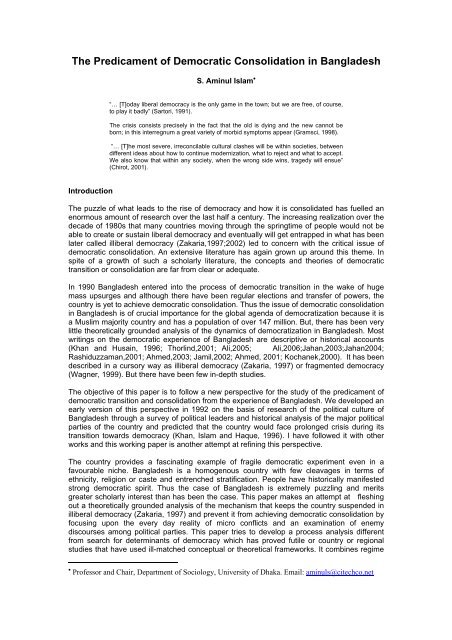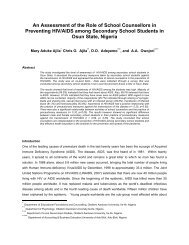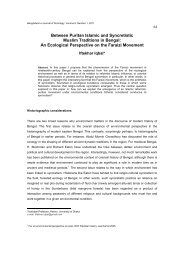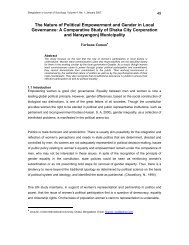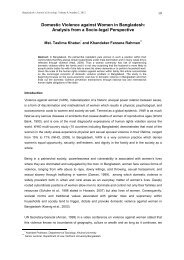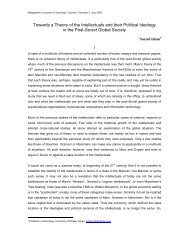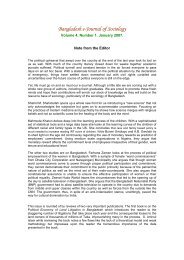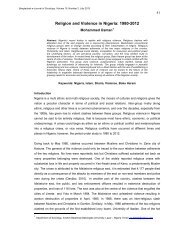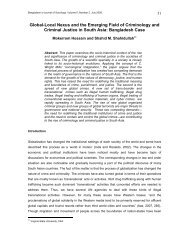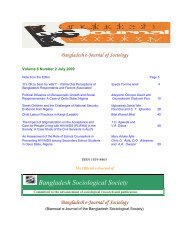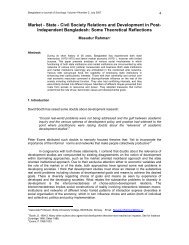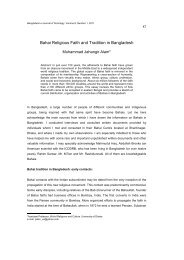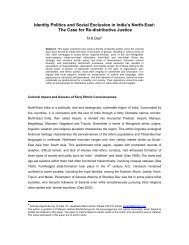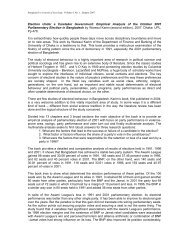The Predicament of Democratic Consolidation in Bangladesh
The Predicament of Democratic Consolidation in Bangladesh
The Predicament of Democratic Consolidation in Bangladesh
Create successful ePaper yourself
Turn your PDF publications into a flip-book with our unique Google optimized e-Paper software.
<strong>The</strong> <strong>Predicament</strong> <strong>of</strong> <strong>Democratic</strong> <strong>Consolidation</strong> <strong>in</strong> <strong>Bangladesh</strong>S. Am<strong>in</strong>ul Islam •“… [T]oday liberal democracy is the only game <strong>in</strong> the town; but we are free, <strong>of</strong> course,to play it badly” (Sartori, 1991).<strong>The</strong> crisis consists precisely <strong>in</strong> the fact that the old is dy<strong>in</strong>g and the new cannot beborn; <strong>in</strong> this <strong>in</strong>terregnum a great variety <strong>of</strong> morbid symptoms appear (Gramsci, 1998).“… [T]he most severe, irreconcilable cultural clashes will be with<strong>in</strong> societies, betweendifferent ideas about how to cont<strong>in</strong>ue modernization, what to reject and what to accept.We also know that with<strong>in</strong> any society, when the wrong side w<strong>in</strong>s, tragedy will ensue”(Chirot, 2001).Introduction<strong>The</strong> puzzle <strong>of</strong> what leads to the rise <strong>of</strong> democracy and how it is consolidated has fuelled anenormous amount <strong>of</strong> research over the last half a century. <strong>The</strong> <strong>in</strong>creas<strong>in</strong>g realization over thedecade <strong>of</strong> 1980s that many countries mov<strong>in</strong>g through the spr<strong>in</strong>gtime <strong>of</strong> people would not beable to create or susta<strong>in</strong> liberal democracy and eventually will get entrapped <strong>in</strong> what has beenlater called illiberal democracy (Zakaria,1997;2002) led to concern with the critical issue <strong>of</strong>democratic consolidation. An extensive literature has aga<strong>in</strong> grown up around this theme. Inspite <strong>of</strong> a growth <strong>of</strong> such a scholarly literature, the concepts and theories <strong>of</strong> democratictransition or consolidation are far from clear or adequate.In 1990 <strong>Bangladesh</strong> entered <strong>in</strong>to the process <strong>of</strong> democratic transition <strong>in</strong> the wake <strong>of</strong> hugemass upsurges and although there have been regular elections and transfer <strong>of</strong> powers, thecountry is yet to achieve democratic consolidation. Thus the issue <strong>of</strong> democratic consolidation<strong>in</strong> <strong>Bangladesh</strong> is <strong>of</strong> crucial importance for the global agenda <strong>of</strong> democratization because it isa Muslim majority country and has a population <strong>of</strong> over 147 million. But, there has been verylittle theoretically grounded analysis <strong>of</strong> the dynamics <strong>of</strong> democratization <strong>in</strong> <strong>Bangladesh</strong>. Mostwrit<strong>in</strong>gs on the democratic experience <strong>of</strong> <strong>Bangladesh</strong> are descriptive or historical accounts(Khan and Husa<strong>in</strong>, 1996; Thorl<strong>in</strong>d,2001; Ali,2005; Ali,2006;Jahan,2003;Jahan2004;Rashiduzzaman,2001; Ahmed,2003; Jamil,2002; Ahmed, 2001; Kochanek,2000). It has beendescribed <strong>in</strong> a cursory way as illiberal democracy (Zakaria, 1997) or fragmented democracy(Wagner, 1999). But there have been few <strong>in</strong>-depth studies.<strong>The</strong> objective <strong>of</strong> this paper is to follow a new perspective for the study <strong>of</strong> the predicament <strong>of</strong>democratic transition and consolidation from the experience <strong>of</strong> <strong>Bangladesh</strong>. We developed anearly version <strong>of</strong> this perspective <strong>in</strong> 1992 on the basis <strong>of</strong> research <strong>of</strong> the political culture <strong>of</strong><strong>Bangladesh</strong> through a survey <strong>of</strong> political leaders and historical analysis <strong>of</strong> the major politicalparties <strong>of</strong> the country and predicted that the country would face prolonged crisis dur<strong>in</strong>g itstransition towards democracy (Khan, Islam and Haque, 1996). I have followed it with otherworks and this work<strong>in</strong>g paper is another attempt at ref<strong>in</strong><strong>in</strong>g this perspective.<strong>The</strong> country provides a fasc<strong>in</strong>at<strong>in</strong>g example <strong>of</strong> fragile democratic experiment even <strong>in</strong> afavourable niche. <strong>Bangladesh</strong> is a homogenous country with few cleavages <strong>in</strong> terms <strong>of</strong>ethnicity, religion or caste and entrenched stratification. People have historically manifestedstrong democratic spirit. Thus the case <strong>of</strong> <strong>Bangladesh</strong> is extremely puzzl<strong>in</strong>g and meritsgreater scholarly <strong>in</strong>terest than has been the case. This paper makes an attempt at flesh<strong>in</strong>gout a theoretically grounded analysis <strong>of</strong> the mechanism that keeps the country suspended <strong>in</strong>illiberal democracy (Zakaria, 1997) and prevent it from achiev<strong>in</strong>g democratic consolidation byfocus<strong>in</strong>g upon the every day reality <strong>of</strong> micro conflicts and an exam<strong>in</strong>ation <strong>of</strong> enemydiscourses among political parties. This paper tries to develop a process analysis differentfrom search for determ<strong>in</strong>ants <strong>of</strong> democracy which has proved futile or country or regionalstudies that have used ill-matched conceptual or theoretical frameworks. It comb<strong>in</strong>es regime• Pr<strong>of</strong>essor and Chair, Department <strong>of</strong> Sociology, University <strong>of</strong> Dhaka. Email: am<strong>in</strong>uls@citechco.net
analysis with agency perspective or parallel discourses and parallel rationalities (Wood, 1994)that actors deploy for undertak<strong>in</strong>g particular courses <strong>of</strong> action. This paper builds on and usesmy own and previous works <strong>of</strong> colleagues (Khan, Islam and Haque, 1996; Islam, 2002a;Islam2002b; Islam, 2003; Islam, 2005a;Islam, 2005b;Islam 2005c; Rahman and Islam (2002).Paradigms <strong>of</strong> democratic transition<strong>The</strong> literature on democratic transition can be viewed <strong>in</strong> terms <strong>of</strong> several paradigms three <strong>of</strong>which have dom<strong>in</strong>ated the field <strong>of</strong> research. <strong>The</strong> early studies that spawned <strong>in</strong> 1950s and1960s were <strong>of</strong> three types. Firstly, some macro level studies -either comparative or specificcountry studies that sought to focus on the genealogy and historical pattern <strong>of</strong> democratictransition and some <strong>of</strong> them turned out to be classics such as Moore (1966); Bendix (1964);Lipset (1963) and Dahl (1956). Secondly, a number <strong>of</strong> other studies tried to explore thedeterm<strong>in</strong>ants <strong>of</strong> democracy through cross-country empirical data. <strong>The</strong>se studies mostlyfocused on England, France, Germany and USA. Thirdly, an extensive scholarly work onpolitical development or modernization grew up from the study <strong>of</strong> political change <strong>in</strong> the Thirdworld. Although these studies were not directly concerned with democracy, but it was no lessclear that the ideal political development or modernization was democratic polity.<strong>The</strong> ma<strong>in</strong> crop <strong>of</strong> research, however, emerged after 1974 and on the basis <strong>of</strong> the experiences<strong>of</strong> southern Europe, East-central Europe, Southeast Europe, former Soviet Union, Lat<strong>in</strong>America, East and South-east Asia, and Africa. <strong>The</strong> search for an empirically grounded theory<strong>of</strong> democratization has largely failed (We<strong>in</strong>er, 1987). <strong>The</strong>re are several fault l<strong>in</strong>es <strong>in</strong> research<strong>in</strong> this area.Firstly, key concepts denot<strong>in</strong>g dependent variables are def<strong>in</strong>ed <strong>in</strong> diverse andambiguous ways so that it becomes difficult to understand whether various scholars areaddress<strong>in</strong>g the same issues. Secondly, empirical studies have produced a bewilder<strong>in</strong>g variety<strong>of</strong> explanatory variables, which lack clarity and specification. Thirdly, studies based on a smallset <strong>of</strong> explanatory variables have not allowed broader generalizations. It seriously affected thegrowth <strong>of</strong> knowledge <strong>in</strong> this area <strong>of</strong> research.This body <strong>of</strong> research has generated four paradigms: bureaucratic – authoritarianism,patrimonialism / neo-patrimonialism, patron-clientelism, and political culture.<strong>The</strong> model <strong>of</strong>bureaucratic –authoritarianism (BA) was largely shaped by O’Donnell(1973). He classifiespolitical regimes <strong>in</strong> terms <strong>of</strong> three dimensions – who govern, who ga<strong>in</strong> and with what policies.In other words he looked <strong>in</strong>to the structure <strong>of</strong> the regime, nature <strong>of</strong> the dom<strong>in</strong>ant politicalcoalitions and strategic public policies, especially those related to <strong>in</strong>dustrialization, <strong>in</strong>creasedpolitical activation <strong>of</strong> the popular sector and the growth <strong>of</strong> technocratic occupational role. Onthe basis <strong>of</strong> these criteria he identified three historic types <strong>of</strong> political systems <strong>in</strong> Lat<strong>in</strong>America – oligarchic, populist and BA. He took particular care to map out the emergence <strong>of</strong>BA <strong>in</strong> terms <strong>of</strong> these criteria.He shows that the end <strong>of</strong> consumer cycle dur<strong>in</strong>g import-substitution <strong>in</strong>dustrialization <strong>in</strong> Lat<strong>in</strong>America led to high fiscal deficit, foreign-<strong>in</strong>debtedness and <strong>in</strong>flation. It <strong>in</strong>evitably causedeconomic austerity and cut <strong>in</strong> distribution for the popular sector which triggered widespreadprotests by the masses. Industrialization led to the rise <strong>of</strong> technocrats – civil and militarybureaucracy and other pr<strong>of</strong>essionals <strong>in</strong> society and they had generally low tolerance forpopulist policy <strong>of</strong> redistribution. Thus they orchestrated the ‘coup coalition’ with a view toend<strong>in</strong>g the populist policy and eventually built up an authoritarian state.Neo-patrimonialismA second paradigm which has been deployed especially for Africa is neo-patrimonialism.<strong>The</strong> term patrimonialism was <strong>in</strong>troduced by Max Weber (Islam, 2005 for details) to refer to aspecific sub-category <strong>of</strong> traditional dom<strong>in</strong>ation. It emerges <strong>in</strong> an agrarian society when a ruleracquires a territory and has an adm<strong>in</strong>istrative staff and a military force to control over it. <strong>The</strong>ruler regards it as his personal property. All <strong>of</strong>fices are regarded as “part <strong>of</strong> the ruler’spersonal household and private property” (Weber, 1978:1028-9). <strong>The</strong> adm<strong>in</strong>istration is
manned by favorites – k<strong>in</strong>smen, clients, dependants and so on who subsist on benefices,taxes or fees or fiefs granted by the ruler. <strong>The</strong>se privileges can be only enjoyed at thediscretion <strong>of</strong> the ruler. <strong>The</strong> adm<strong>in</strong>istration is run along “purely personal connections, favors,promises and privileges” (Weber, 1978, 1041). When such a system becomes extremelyarbitrary and the ruler becomes totally discretionary <strong>in</strong> his behaviour, it is called “sultanism”. Inthe Religion <strong>of</strong> Ch<strong>in</strong>a, Weber highlights some critical aspects <strong>of</strong> patrimonialism. Bribes werepervasive <strong>in</strong> bureaucracy. People had to pay bribes for any <strong>of</strong>ficial act and the bribes wouldpass on to the top level <strong>of</strong> the bureaucracy. <strong>The</strong> expansion <strong>of</strong> trade and money economyfueled the rent seek<strong>in</strong>g behaviour and led to the prebendalization <strong>of</strong> state economy. It turned<strong>in</strong>to a major obstacle for development <strong>of</strong> the capitalist economy as it led to the ossification <strong>of</strong>the social structure (Weber, 1964: 61).Its use <strong>in</strong> the context <strong>of</strong> third world states began <strong>in</strong> 1966 when Guenther Roth (1968) po<strong>in</strong>tedout that many third world states were hardly states <strong>in</strong> modern sense <strong>of</strong> the term; they wererather patrimonial regimes. Zolberg was first to use it <strong>in</strong> the context <strong>of</strong> Africa (Medard, 1982).Later some theorists found that third world states were <strong>of</strong>ten an admixture <strong>of</strong> what Webercalled legal-rational dom<strong>in</strong>ation and patrimonialism. It led to the co<strong>in</strong><strong>in</strong>g <strong>of</strong> the term neopatrimonialism(Eisenstadt, 1973). Jean-Francois Medard (1982) elaborated the concept,used it <strong>in</strong> the context <strong>of</strong> Africa and thus spearheaded a new paradigm.In Africa, holds Callaghy, not authoritarianism, but the absence <strong>of</strong> the state is a key problem.In Africa neo-patrimonial regimes are characterized by follow<strong>in</strong>g characteristics (Bratton andWallie, 1994; Callaghy, 1984; Lemerchand, 1981):• Sate power is equated with will <strong>of</strong> the people• Authority is viewed as absolute to be enjoyed by the leader without restra<strong>in</strong>t andpreclud<strong>in</strong>g any criticism• <strong>The</strong>re is no separation between private and public resources and people <strong>in</strong> powerhave the right to extract resources from people and distribute it for political ends• Public <strong>in</strong>stitutions are both highly centralized and run through private discretion.• <strong>The</strong> state <strong>in</strong>terference over the economy is so high that it has given rise to the graveproblem <strong>of</strong> free rid<strong>in</strong>g and extreme rent seek<strong>in</strong>g.• Public <strong>of</strong>fices are the ma<strong>in</strong> source <strong>of</strong> rent• Legal traditions and <strong>in</strong>stitutional forms are strik<strong>in</strong>gly fragmented and weak• Civil society is fragile due to dearth <strong>of</strong> broad-spectrum associational life, impersonaltrust and social capital.• Collective action is fledgl<strong>in</strong>gThis description fits well many third world states beyond Africa. This paradigm is particularlysuitable for countries at lower levels <strong>of</strong> socio-economic development. It appears to expla<strong>in</strong><strong>Bangladesh</strong> situation better than the bureaucratic authoritarianism model. <strong>The</strong> paradigm,however, suffers from the limitations that it neglects external factors that contribute towardssusta<strong>in</strong><strong>in</strong>g the neo-patrimonial regime. A major challenge here is to <strong>in</strong>tegrate external factorsthat greatly imp<strong>in</strong>ge upon such a regime.Patron-clientelism<strong>The</strong> concept <strong>of</strong> patron-clientelism, born <strong>in</strong> the <strong>in</strong>terstices <strong>of</strong> anthropology, has been a powerfulconceptual framework for the study <strong>of</strong> politics <strong>in</strong> both developed and develop<strong>in</strong>g countries. Ithas been deployed for study<strong>in</strong>g specific structural patterns <strong>of</strong> human relationships rang<strong>in</strong>gfrom mach<strong>in</strong>e politics <strong>of</strong> US cities (Merton, 1957), crim<strong>in</strong>al gangs to livelihoods at the marg<strong>in</strong><strong>of</strong> rural life. <strong>The</strong> importance <strong>of</strong> this research area is <strong>in</strong>dicated <strong>in</strong> the fact that a selectbibliography listed 553 entries by the end <strong>of</strong> 1970 (Roniger, 1981).Patron-clientelism refers essentially to an asymmetrical relationship <strong>in</strong> which a powerfulperson provides reward to and protection for a weaker person or persons <strong>in</strong> return for loyalty,service and support. It is a k<strong>in</strong>d <strong>of</strong> relationship <strong>in</strong> which there is coercion, masked exploitationand consent through the aura <strong>of</strong> fictive k<strong>in</strong>ship or primordial loyalty. Predom<strong>in</strong>antly a feature<strong>of</strong> the simple or peasant society, it is also present <strong>in</strong> many modern and moderniz<strong>in</strong>g societies.In its political form, clients form a support base and vote bank for the patron <strong>in</strong> exchange foreconomic resources and other services that clients require.
Clientelism, argues Maiz and Requejo (2001), and Gambatta, (1988) flourishes <strong>in</strong> a socialsett<strong>in</strong>g <strong>of</strong> general distrust. It represents an effort at creat<strong>in</strong>g fragmented social bond –personalized and particularistic confidence <strong>in</strong> the face <strong>of</strong> ‘dark social capital’ – <strong>in</strong>stead <strong>of</strong>common confidence <strong>in</strong> others.Magaloni,Diaz Cayerosand Estevez (2006) have argued thatpoliticians tend to diversify their electoral <strong>in</strong>vestment strategies by comb<strong>in</strong><strong>in</strong>g transfer <strong>of</strong>resources through clientelistic channels and public provision <strong>of</strong> goods under a situationwhere electoral outcome is uncerta<strong>in</strong>. As they cannot be sure that the supply <strong>of</strong> goods andservices that would be enjoyed by all, they tend to use clientelistic network to supply goodsand services to safe constituencies and loyal party men with a view to m<strong>in</strong>imiz<strong>in</strong>g risk <strong>of</strong>loos<strong>in</strong>g. Clientelism reduces the risk <strong>of</strong> loos<strong>in</strong>g because it benefits loyal supporters andpunish opponents. Clientelism is widespread under conditions <strong>of</strong> poverty and scarcity <strong>of</strong>resources and tends to decl<strong>in</strong>e with economic development.<strong>The</strong> clientelistic structure, however, is <strong>in</strong>herently unstable because <strong>of</strong> dra<strong>in</strong> and exhaustion <strong>of</strong>resources <strong>of</strong> the patron or competition among patrons or political programmes or ideologieshav<strong>in</strong>g greater appeal. A patron must be able to provide more and more rewards or <strong>in</strong>centivesaga<strong>in</strong>st his competitors or alternative <strong>in</strong>stitutions with greater <strong>in</strong>centives. Thus patron-clientsystem has an <strong>in</strong>herent tendency towards generat<strong>in</strong>g resources through corruption orsuperimpos<strong>in</strong>g corruption circuits upon clientelistic networks.Political CulturesLispet(1963), Almond and Verba (1963) and Lucien Pye (1965) shaped the paradigm <strong>of</strong>political culture <strong>in</strong> early 1960s and the decade saw a flower<strong>in</strong>g <strong>of</strong> research on political culture.<strong>The</strong>y held that the concept <strong>of</strong> political culture meant that there was a durable and consistentpattern <strong>in</strong> people’s beliefs, values and attitudes, values, about the political system <strong>of</strong> thecountry and that it predeterm<strong>in</strong>ed the nature <strong>of</strong> political system. Almond and Verba (1963) <strong>in</strong>their classic study <strong>of</strong> political culture showed that the soul <strong>of</strong> democracy lay <strong>in</strong> what theycalled civic culture – norms and values that encourage rational activism <strong>in</strong> politics. Itdeveloped first <strong>in</strong> Great Brita<strong>in</strong> and then flourished <strong>in</strong> the USA. <strong>The</strong> success <strong>of</strong> democracy <strong>in</strong>develop<strong>in</strong>g countries which suffered from parochial culture depended critically on theflower<strong>in</strong>g <strong>of</strong> civic culture <strong>in</strong> these societies. But <strong>in</strong> the course <strong>of</strong> 1970s it suffered a setback asa consequence <strong>of</strong> a number <strong>of</strong> factors <strong>in</strong>clud<strong>in</strong>g the growth <strong>of</strong> radicalism, and rise <strong>of</strong> rationalchoice theory (Almond, 1994).<strong>The</strong> concept <strong>of</strong> political culture has re-emerged <strong>in</strong> recent years <strong>in</strong> the context <strong>of</strong> the centrality<strong>of</strong> culture <strong>in</strong> a post modern society and the sweep<strong>in</strong>g changes which are tak<strong>in</strong>g place <strong>in</strong> thepolitical landscape <strong>of</strong> contemporary society as a response to multiculturalism anddigitalization <strong>of</strong> the life world. <strong>The</strong> importance <strong>of</strong> political culture has been particularly viewed<strong>in</strong> the specific arena <strong>of</strong> democratic polity and the process <strong>of</strong> democratization. In recent yearsthere has been <strong>in</strong>creas<strong>in</strong>g awareness that specific form <strong>of</strong> modernities and the pattern <strong>of</strong>political cultures <strong>of</strong> a country are the most important factors <strong>in</strong> the success or failure <strong>of</strong>democracy. From late 1980s Inglehart (1988) noticed a renaissance <strong>in</strong> the study <strong>of</strong> politicalculture that has cont<strong>in</strong>ued to produce a significant body <strong>of</strong> new ideas. Hunt<strong>in</strong>gton (1981)identified four historical periods <strong>of</strong> change, conflict and consensus <strong>in</strong> American politicalculture. In a milestone study Ronald Inglehart (1990) po<strong>in</strong>ted out that greater affluence <strong>in</strong> theUSA had produced a whole range <strong>of</strong> new political issues centered on lifestyle and culture.Issues <strong>of</strong> identity, sexuality, ethnicity, environment and similar other cultural issues had burstforth as new political agenda. In early 1990s Samuel Hunt<strong>in</strong>gton (1993a) showed the culturalpattern <strong>of</strong> the global expansion <strong>of</strong> democracy <strong>in</strong> wave-like forms. He (1993b) also brought toglobal attention an image <strong>of</strong> contemporary history as the battlefield <strong>of</strong> civilizations – clash <strong>of</strong>civilizations between democratic polities and non-democratic Islamic outposts.Inglehart (Inglehart and Welzel 2003) has now developed a more ref<strong>in</strong>ed <strong>in</strong>dex <strong>of</strong> selfexpressionvalues which more accurately predict his earlier scales <strong>of</strong> impersonal trust and lifesatisfaction. Self-expression values represent an emphasis on liberty, participation, public selfexpression, tolerance <strong>of</strong> diversity, impersonal trust and life satisfaction. <strong>The</strong>se aspects <strong>of</strong>
political culture at <strong>in</strong>dividual, national and cross national levels largely expla<strong>in</strong> the existence <strong>of</strong>effective democracy.A society’s prevail<strong>in</strong>g attitudes on self-expression values dimension <strong>in</strong> about1990…expla<strong>in</strong> fully 75 percent <strong>of</strong> the cross-national variation <strong>in</strong> effective variation <strong>in</strong>1999-2000. This effect does not simply reflect other <strong>in</strong>fluences, such as economicdevelopment. <strong>The</strong> effect <strong>of</strong> self-expression values rema<strong>in</strong>s robust when one controls foreconomic development, experience with democracy, and even support fordemocracy…(Inglehart and Welzel,2003: 69).<strong>The</strong>re is also now an emphasis on newer dimensions <strong>of</strong> political culture. In recent years thecyberspace is be<strong>in</strong>g constructed as political space and a new form <strong>of</strong> political culture – a newpolitical community with heterogeneous <strong>in</strong>terests. In this sense post modern political culture is<strong>in</strong>herently fragmented. <strong>The</strong> Internet is be<strong>in</strong>g used ‘<strong>in</strong> a thousand social projects, many <strong>of</strong>which conflict with one another’ (Agee, 2002).<strong>The</strong> awareness <strong>of</strong> chang<strong>in</strong>g political reality <strong>in</strong> the age <strong>of</strong> globalization has led to changes <strong>in</strong>the scholarly perceptions <strong>of</strong> political culture. One significant change is the rejection <strong>of</strong>determ<strong>in</strong>ism. As Larry Diamond (1994:9) po<strong>in</strong>ts out:Three decades <strong>of</strong> research s<strong>in</strong>ce <strong>The</strong> Civic Culture have shown that the cognitive,attitud<strong>in</strong>al, and evaluational dimensions <strong>of</strong> political culture are fairly ‘plastic’ and canchange quite dramatically <strong>in</strong> response to regime performance, historical experience,and political socialization.A second aspect <strong>of</strong> change <strong>in</strong> perspective is the view, as already mentioned, that politicalculture has many layers or forms which are historically shaped and thus diverse. Differenthistorical conjunctures can activate different layers <strong>of</strong> this culture.As Richard Sisson (1994) shows that key factors that shaped Indian political culture <strong>in</strong>cluded:• <strong>The</strong> pr<strong>in</strong>ciple <strong>of</strong> freedom <strong>of</strong> speech, assembly and movement had taken strongroots dur<strong>in</strong>g the colonial times.• <strong>The</strong> culture <strong>of</strong> liberal democracy had become the dom<strong>in</strong>ant ideology <strong>of</strong> thenational elite or the middle class.• Gandhi’s strategy <strong>of</strong> controlled agitation-he called <strong>of</strong>f any movement that sparkedviolence.• Barga<strong>in</strong><strong>in</strong>g and compromises were struck with<strong>in</strong> the framework <strong>of</strong> <strong>in</strong>digenousassociational life.• A tradition <strong>of</strong> conflict resolution through imposition or arbitration• National elites were able to construct a vision <strong>of</strong> national community <strong>in</strong> colonialperiod that has survived through many vicissitudes• <strong>The</strong>re has developed a mass <strong>of</strong> responsive citizenry which is reasonably well<strong>in</strong>formed,<strong>in</strong>volved and alert to hold the government accountable.Social capital and democratic political culture<strong>The</strong> concept <strong>of</strong> social capital has an extra-ord<strong>in</strong>ary career s<strong>in</strong>ce its formulation by JamesColeman <strong>in</strong> mid 1980s. Although the paradigm <strong>of</strong> social capital had its orig<strong>in</strong> <strong>in</strong> 1980s <strong>in</strong> thewrit<strong>in</strong>gs <strong>of</strong> James Coleman, it became highly <strong>in</strong>fluential through the work <strong>of</strong> Robert Putnam(1993; 1971;Putnam and Nanetti, 1988). Putnam’s work became an exemplar <strong>of</strong> a theoryapplied successfully to trace the different historical paths <strong>of</strong> associational life, localgovernment and democratic and authoritarian forms political life <strong>in</strong> the north and south <strong>of</strong>Italy. <strong>The</strong> book has become a m<strong>in</strong>or classic, given birth to a paradigm and stimulated massiveresearch efforts across discipl<strong>in</strong>es and all over the world.Putnam def<strong>in</strong>ed social capital as trust, norms, reciprocity and networks that underlieassociational life. Yet, there has been fierce disagreement about the precise mean<strong>in</strong>g <strong>of</strong> theterm and factors that create social capital. <strong>The</strong>re has been strong warn<strong>in</strong>g about tak<strong>in</strong>g anaïve and romantic view <strong>of</strong> networks. Networks are embedded <strong>in</strong> community life, which isalso punctuated by power struggles. Deviant subcultures and groups such as gangs have
strong networks. Do they manifest social capital? Thus there is new demand for greater clarity<strong>of</strong> the concept.<strong>The</strong>se rightw<strong>in</strong>g and leftw<strong>in</strong>g takes on social capital are both upbeat, optimistic, <strong>in</strong>view<strong>in</strong>g social capital as an avenue either to outflank the state or to comb<strong>in</strong>e strongcivil society, strong state, strong economy. Social capital has thus become a newterra<strong>in</strong> <strong>of</strong> rhetorical position<strong>in</strong>g and ideological contestation, which calls for greateranalytic clarity (Pieterse, 2001:124).<strong>The</strong>se controversies have led to the problem <strong>of</strong> measurement at empirical level. How can wemeasure social capital and what is to measure? What is the relationship between agency andsocial capital? Paxton (2002) has developed a more ref<strong>in</strong>ed measurement <strong>of</strong> social capitaland found that social capital and democracy are closely related. Social capital assistsdemocratic transition through develop<strong>in</strong>g anti-regime discourse and promot<strong>in</strong>g anti-regimemovements. Firstly, it helps the spread <strong>of</strong> ideas and values oppos<strong>in</strong>g the regime throughsocial networks and ties and makes it credible. Secondly, it fosters democratic movement byprovid<strong>in</strong>g resources, organizational space and leadership. It also assists <strong>in</strong> the consolidation<strong>of</strong> democracy. Increased participation <strong>in</strong> voluntary associations leads to greater politicalparticipation by people and <strong>in</strong>tensity and quality <strong>of</strong> participation. It also aids socialization <strong>of</strong>future generations). Her quantitative analysis <strong>of</strong> a large sample <strong>of</strong> countries shows that socialcapital has a reciprocal relationship with democracy; it fosters democracy and democracy <strong>in</strong>turn fosters democracy. However, connected associations had strong positive effect ondemocracy and isolated associations had strong negative impact (Paxton, 2002).Thus it is no wonder that the issue <strong>of</strong> social capital still has generated a great deal <strong>of</strong> <strong>in</strong>terest.It is ma<strong>in</strong>ly because social capital creates a strong civil society, promotes and consolidatesdemocracy.<strong>Democratic</strong> transitionIt is <strong>in</strong> this context <strong>of</strong> regime analysis that the discourses <strong>of</strong> democratic transition ordemocratic consolidation have flourished. Although there has been considerable scholarlywork <strong>in</strong> this area, there has been little by way <strong>of</strong> theoretical analysis apart from some <strong>in</strong>itialmapp<strong>in</strong>g <strong>of</strong> the phases <strong>of</strong> transition or mechanisms <strong>in</strong>volved <strong>in</strong> the process <strong>of</strong> transition(O’Donnell, Schmitter, and Whitehead, 1988). A landmark study <strong>of</strong> 26 countries by Diamond,L<strong>in</strong>z and Lipset(1990) provides historical narratives and a catalogue <strong>of</strong> factors which weredeemed as relevant for understand<strong>in</strong>g the process. <strong>The</strong> analytical or theoretical vacuum hasbeen particularly felt because many post transitional democracies have not moved towardsliberal democracy; they have rema<strong>in</strong>ed suspended between authoritarianism and democracy.Zakaria (1997) f<strong>in</strong>ds that about half <strong>of</strong> the countries between dictatorship and consolidateddemocracy <strong>in</strong>clud<strong>in</strong>g <strong>Bangladesh</strong> fall under the rubric <strong>of</strong> illiberal democracy. Illiberalism is nota pass<strong>in</strong>g phase; it is likely to be one <strong>of</strong> the permanent forms <strong>of</strong> democracy. It ischaracterized by partisan state, and technocratic control <strong>of</strong> public space and lack <strong>of</strong> genu<strong>in</strong>epluralism. In fact illiberal democracies are on the rise <strong>in</strong>creas<strong>in</strong>g from 22 percent to about 50percent between 1990 and 1997. Illiberal democracy is a democracy where elections are notcompletely fair and free and civil liberties not totally guaranteed. In 2002 Zakaria (Zakaria2002) found that the trend towards illiberal democracy had actually hardened.Santiso(2001) has also argued that transitional democracies can be described as hybridregime; restricted, uncerta<strong>in</strong>, <strong>in</strong>complete, illiberal or fragile democracies. <strong>The</strong>se countries arecharacterized by unstable governance, economic uncerta<strong>in</strong>ty, hollow <strong>in</strong>stitutions, fluid politicalprocesses, and unconsolidated party systems. Many emergent democracies have ended up,<strong>in</strong> a gray middle zone <strong>of</strong> so many transitions <strong>of</strong> that period, hav<strong>in</strong>g neither moved rapidly andpa<strong>in</strong>lessly to democracy nor fallen back to outright authoritarianism (Santiso, 2001:156).Thus although these paradigms have generated a fruitful stream <strong>of</strong> research, they haverema<strong>in</strong>ed descriptive, partial, nested and sketchy. <strong>The</strong> recent works on democratic transitionmanifest “a range <strong>of</strong> fundamental problems“ that plague the research <strong>in</strong> this area. Firstly, Keyconcepts denot<strong>in</strong>g dependent variables are def<strong>in</strong>ed <strong>in</strong> diverse and ambiguous way so that itbecomes difficult to understand whether various scholars are address<strong>in</strong>g the same issues.
Secondly, empirical studies have produced a bewilder<strong>in</strong>g variety <strong>of</strong> explanatory variableswhich lack clarity and specification. Thirdly, studies based on a small set <strong>of</strong> explanatoryvariables have not allowed broader generalizations. It has seriously affected the growth <strong>of</strong>knowledge <strong>in</strong> this area <strong>of</strong> research.This is particularly true for research on democratic consolidation. Although the idea <strong>of</strong>democratic consolidation has become one <strong>of</strong> the most widely used <strong>in</strong> the discourse ondemocracy, its popularity seems to have been built on the “quicksand <strong>of</strong> semantic ambiguity”(Schedler,1997). He th<strong>in</strong>ks that the concept has led to a state <strong>of</strong> conceptual disorder and ithas <strong>in</strong>creas<strong>in</strong>gly been covered by dense fog.Some simulate the use <strong>of</strong> DC[democratic consolidation, author] by <strong>in</strong>clud<strong>in</strong>g it <strong>in</strong> thetitle <strong>of</strong> some book or article but without mak<strong>in</strong>g any further reference to it <strong>in</strong> the ma<strong>in</strong>text. Some try to give the term more precision by refocus<strong>in</strong>g it from national politicalsystems to political subsystems. Some try to do the same by disaggregat<strong>in</strong>g it <strong>in</strong>toseveral dimensions. Some avoid the term and keep silent about it <strong>in</strong> order to <strong>in</strong>troducedifferent terms <strong>in</strong>to the study <strong>of</strong> new democracies, such as democratic governance or<strong>in</strong>stitutionalization. Some … calls for more conceptual analysis. And f<strong>in</strong>ally, somequestion the very usefulness <strong>of</strong> the concept or even advocate the radical conclusionthat we should get rid <strong>of</strong> it altogether (Schedler, 1997:4).Phillipe Schimitter (1996) argues that no s<strong>in</strong>gle rule or <strong>in</strong>stitution is sufficient for democraticconsolidation, not even such card<strong>in</strong>al criteria such as, majority rule, territorial representation,competitive elections, parliamentary sovereignty or party system. <strong>The</strong> key feature <strong>of</strong>democratic consolidation is the acceptance <strong>of</strong> the rules <strong>of</strong> competition for <strong>of</strong>fice, “cooperationand consent <strong>in</strong> the formation <strong>of</strong> government or opposition and cont<strong>in</strong>gency <strong>in</strong> the mobilization<strong>of</strong> consent and assent” (Schmitter, 1996:298). It is no wonder that many scholars havecharged such ideas as nebulous.Recently efforts are underway for salvag<strong>in</strong>g the concept <strong>of</strong> democratic consolidation andmake it operational (Schedler, 1997). Schaedler (1997) has analyzed democraticconsolidation <strong>in</strong> the context <strong>of</strong> a classification <strong>of</strong> regime types. By comb<strong>in</strong><strong>in</strong>g empirical andnormative perspectives, he has divided political regimes <strong>in</strong>to authoritarianism semidemocracy,liberal democracy, and advanced democracy. In this context democraticconsolidation can be viewed <strong>in</strong> terms <strong>of</strong> five components.• Avoid<strong>in</strong>g democratic breakdown• Avoid<strong>in</strong>g democratic erosion• Institutionaliz<strong>in</strong>g democracy• Complet<strong>in</strong>g democracy• Deepen<strong>in</strong>g democracySchaedler (2001) views it <strong>in</strong> terms <strong>of</strong> positive and negative delimit<strong>in</strong>g <strong>of</strong> the concept. <strong>The</strong>positive component consists <strong>of</strong> completion and deepen<strong>in</strong>g <strong>of</strong> democracy. <strong>The</strong> negativecomponent embodies avoidance <strong>of</strong> breakdown and erosion. <strong>The</strong> conceptualiz<strong>in</strong>g <strong>of</strong> the termalso <strong>in</strong>volves a time dimension – past achievement <strong>in</strong> terms <strong>of</strong> stability and future prospects.<strong>The</strong> extent <strong>of</strong> consolidation can be assessed either <strong>in</strong>ternally through participant’s perspectiveor externally through observer’s perspective. It calls for multi-level causal analysis <strong>in</strong>volv<strong>in</strong>gstructural contexts, and attitudes and behavior <strong>of</strong> actors that lead to democratic stability.Structural contextsActors’ attitudes and behavior<strong>Democratic</strong> stabilityThus democratic consolidation can be measured <strong>in</strong> terms <strong>of</strong> a set <strong>of</strong> behavior which isobservable, a body <strong>of</strong> attitudes which is measurable and <strong>in</strong>stitutional contexts <strong>in</strong> terms <strong>of</strong><strong>in</strong>centives and constra<strong>in</strong>ts.<strong>The</strong> author proposes that the best way to capture the conf<strong>in</strong>es <strong>of</strong> liberal democracy is to mapout the action and behavior that show that the actors have withdrawn from the rules <strong>of</strong> thedemocratic game. From this perspective, he proposes three <strong>in</strong>ter-related measures –violence, rejection <strong>of</strong> elections and transgression <strong>of</strong> authority.
<strong>The</strong> concept <strong>of</strong> liberal democracy dictates that political competition should be conductedthrough a set <strong>of</strong> rules designed on the basis <strong>of</strong> consensus that reduces violence to the lowestlevel <strong>in</strong> social life.• <strong>The</strong> assass<strong>in</strong>ation <strong>of</strong> political competitors,• Attacks aga<strong>in</strong>st the liberty, physical <strong>in</strong>tegrity, and property <strong>of</strong> political adversaries,• <strong>The</strong> <strong>in</strong>timidation <strong>of</strong> voters and candidates,• Violent attempts to overthrow elected <strong>of</strong>ficials,• Ethnic and social cleans<strong>in</strong>g,• Riots,• Destruction <strong>of</strong> public property<strong>The</strong> rejection <strong>of</strong> electionsIf political parties• Refuse to participate <strong>in</strong> democratic elections,• Actively deny others the right to participate• Try to control electoral outcomes through fraud and <strong>in</strong>timidation• Do not accept the outcomes <strong>of</strong> democratic elections• Mobilize extra-<strong>in</strong>stitutional protest, boycott elected assemblies,• Take up the arms to overthrow elected authorities by force<strong>The</strong> transgression <strong>of</strong> authorityLiberal democracy is premised upon rule <strong>of</strong> law and both political leaders and thebureaucracy must obey the rule <strong>of</strong> law.But democratic alarm bells go <strong>of</strong>f when public <strong>of</strong>ficials start ignor<strong>in</strong>g the legal boundaries<strong>of</strong> their <strong>of</strong>fice. When they start violat<strong>in</strong>g prevalent rules <strong>of</strong> rule mak<strong>in</strong>g, rule enforcement,rule <strong>in</strong>terpretation, or conflict settlement, democrats have to be on watch.. .as violations <strong>of</strong>rules and meta-rules develop <strong>in</strong>to a recurrent practice <strong>in</strong> salient cases, the prospects <strong>of</strong>democracy darken (Schedler, 2001).Democracy suffers from crises when such violations become chronic. <strong>The</strong>re are threepossible outcomes <strong>of</strong> such crises:• Democracy breaks down;• <strong>The</strong> democratic regime lapses <strong>in</strong>to a permanent state <strong>of</strong> fragility• <strong>Democratic</strong> actors undertake countervail<strong>in</strong>g action and rebuild the fabric <strong>of</strong>democratic society.Thus the outcome depends upon how the agency acts out under the given structural situation.<strong>The</strong> gold test <strong>of</strong> democratic consolidation set by Hunt<strong>in</strong>gton(1993) is two-turn over test <strong>in</strong>which a government has been changed through two successive elections with losersaccept<strong>in</strong>g the results. <strong>The</strong> underly<strong>in</strong>g logic is the normative commitment to the spirit odemocracy. Andreas Schaedler (2001) f<strong>in</strong>ds this test as <strong>in</strong>adequate and views that a set <strong>of</strong>broader <strong>in</strong>dicators are necessary for assess<strong>in</strong>g the state <strong>of</strong> consolidation with<strong>in</strong> a regime andacross the regimes.One such important <strong>in</strong>dicator crucially relevant here is <strong>in</strong>stitutionaliz<strong>in</strong>g competitive electionsor electoral governance – an area which has failed to attract adequate scholarly attention.However, Alexander (2001) argues that democratic <strong>in</strong>stitutions are not adequate for predict<strong>in</strong>gconsolidation. Formal political <strong>in</strong>stitutions like electoral systems, separation <strong>of</strong> power betweenlegislative and executive or decentralization play two major roles for consolidation. Firstly,organizations are outcomes <strong>of</strong> <strong>in</strong>teraction <strong>of</strong> self-motivated actors. Secondly, they serve as aplatform for competitive groups to engage <strong>in</strong> future <strong>in</strong>teraction and policy mak<strong>in</strong>g. Thus theparliament provides space for “enhanced block<strong>in</strong>g powers” and prospect for future commandover it and reduces the chance for “political battles”. But these two roles are not adequatebecause actors can change the <strong>in</strong>stitutions and their operation.
<strong>The</strong> discussion above shows that the challenge <strong>of</strong> theory construction <strong>in</strong> the area <strong>of</strong>democratic transition or consolidation is <strong>in</strong>deed great. A prelim<strong>in</strong>ary and essential task is toundertake paradigm–bridg<strong>in</strong>g so that fragmented research traditions can beg<strong>in</strong> to cohere andcongeal fuell<strong>in</strong>g more fruitful empirical research that can serve as feedback for theoryconstruction. A second task is to move away from the study <strong>of</strong> discrete causal factors ordeterm<strong>in</strong>ants and sheer historical narratives to a process analysis with the objective <strong>of</strong>explor<strong>in</strong>g the mechanism through which a given political structure is produced andreproduced <strong>in</strong> specific space and time. F<strong>in</strong>ally, there is the important task <strong>of</strong> <strong>in</strong>tegrat<strong>in</strong>g macroand micro analysis.<strong>The</strong> section below provides an elementary effort at such a task <strong>in</strong> the context <strong>of</strong> recent crisis<strong>of</strong> democratic transition <strong>in</strong> <strong>Bangladesh</strong>. It is to be mentioned here that <strong>Bangladesh</strong> haspassed two-turn over test as stipulated by Hunt<strong>in</strong>gton (1993) and yet failed to consolidate herdemocracy.<strong>The</strong> case <strong>of</strong> <strong>Bangladesh</strong><strong>The</strong> post-colonial history <strong>of</strong> <strong>Bangladesh</strong> for a period <strong>of</strong> six decades from 1947 is an importantexample <strong>of</strong> what has been called “path-dependence”. Although the country as part <strong>of</strong> formerPakistan began with parliamentary government, it soon reverted to authoritarianism. In 1971<strong>Bangladesh</strong> began its journey as a newly <strong>in</strong>dependent nation after a war <strong>of</strong> liberation, whichexacted great sacrifice from people, with a parliamentary form <strong>of</strong> government. But the countrysoon plunged <strong>in</strong>to a series <strong>of</strong> coups and counter-coups and got caught <strong>in</strong>to “a legacy <strong>of</strong>blood” (Mascarenas, 1986). A protracted mass agitations extend<strong>in</strong>g more than n<strong>in</strong>e years ledto the fall <strong>of</strong> the last <strong>of</strong> the military dictators – General Ershad and the establishment <strong>of</strong> aparliamentary form <strong>of</strong> government <strong>in</strong> 1991. Dur<strong>in</strong>g 1980s political parties <strong>in</strong> <strong>Bangladesh</strong>numbered nearly 200 and party fragmentation was very high (Khan, Islam and Haque, 1996).But the general election <strong>in</strong> 1991 made it clear that the country had achieved a stable twopartydom<strong>in</strong>ant system which was particularly useful for an emerg<strong>in</strong>g democracy.Although <strong>Bangladesh</strong> began its transition to democracy through great popular upris<strong>in</strong>gs andwith great hopes, it has not been able to consolidate its democracy even after three generalelections. <strong>The</strong> Freedom House currently ranks <strong>Bangladesh</strong> as partially free with scores <strong>of</strong> 4for political rights and civil liberties (Freedom House, 2005).In spite <strong>of</strong> regular elections,democracy has become largely <strong>in</strong>effective <strong>in</strong> the country because <strong>of</strong> contentious politicsbetween two major parties – Awami League (AL) and <strong>Bangladesh</strong> Nationalist Party (BNP).Although the country has great possibility for rapid development, its prospect has beenmarred by a political war between two major political parties <strong>of</strong> the country – between SheikhHas<strong>in</strong>a’s Awami League and Begum Khaleda Zia’s BNP.Democracy is strangled by a poisonous political war between Zia’s right-<strong>of</strong>-center<strong>Bangladesh</strong> National Party (BNP) and the left-lean<strong>in</strong>g Awami league. Reject<strong>in</strong>g anynotion <strong>of</strong> bipartisanship, both parties seem to keep the nation perpetually on the verge<strong>of</strong> chaos alternat<strong>in</strong>g between state repression or crippl<strong>in</strong>g national strikes aimed attoppl<strong>in</strong>g the government, depend<strong>in</strong>g on who is <strong>in</strong> power. With politics <strong>of</strong>ten reduced tolittle more than a big brawl, violence <strong>in</strong>fects much <strong>of</strong> daily life. Gangs armed withbarbers’ razors roam city streets, extortion is wide spread, beat<strong>in</strong>gs are rout<strong>in</strong>e. <strong>The</strong>bilious feud <strong>Bangladesh</strong>’s lead<strong>in</strong>g women also hobbles the country. Asked about thehostility between her and Awami Lague leader Sheikh, Zia replies: “Ask her”. For herpart, Has<strong>in</strong>a accuses Zia <strong>of</strong> everyth<strong>in</strong>g from stag<strong>in</strong>g “a drama” with the militant arreststo secretly be<strong>in</strong>g beh<strong>in</strong>d an attempt to have her assass<strong>in</strong>ated <strong>in</strong> 2004 when a bombkilled 22 people(Time 10 April,2006:16).Thus the democratic phase <strong>of</strong> the country from 1991 clearly represents a cycle – a cycle <strong>of</strong>clientelistic and coercive politics when a party or alliance is <strong>in</strong> power and a cycle <strong>of</strong> agitationsor mobilization politics when it is <strong>in</strong> the opposition. Both the major political parties and itsalliances have shown this tendency. As a lead<strong>in</strong>g economist <strong>of</strong> the country has observed:In response to the perceived unfair behaviour <strong>of</strong> the rul<strong>in</strong>g party successiveoppositions have moved on to a highly confrontational political path, lead<strong>in</strong>g to boycott
<strong>of</strong> parliament, <strong>in</strong>vocation <strong>of</strong> hartals and a relocation <strong>of</strong> opposition political activity awayfrom parliament and <strong>in</strong>to the streets(Sobhan,2001:84).Contours <strong>of</strong> the conflict: Elections and Parliament<strong>The</strong> present crisis <strong>of</strong> transition began when bye–elections were held <strong>in</strong> early 1994 <strong>in</strong> somevacant seats <strong>of</strong> the Parliament, especially the election <strong>in</strong> a constituency <strong>of</strong> Magura <strong>in</strong> thesouth-west <strong>of</strong> the country, the Awami League and some other opposition parties charged theBNP <strong>of</strong> ‘massive rigg<strong>in</strong>g’ and ‘deceiv<strong>in</strong>g the voters and kill<strong>in</strong>g democracy by hold<strong>in</strong>g a mockelection’ (cited <strong>in</strong> Hasanuzzaman : 104). It also sparked <strong>of</strong>f major mass agitations organizedby the Awami League and several other opposition parties. <strong>The</strong>re was demand for a neutralcaretaker government for hold<strong>in</strong>g free and fair elections. <strong>The</strong>re was an effort at mediat<strong>in</strong>g theimpasse through the <strong>in</strong>itiative <strong>of</strong> the Commonwealth Secretary General, but it failed. It led tothe en masse resignation <strong>of</strong> the Awami League and other ma<strong>in</strong>stream opposition membersfrom the Parliament on 28 th December, 1994. <strong>The</strong> BNP held general elections withoutparticipation <strong>of</strong> the ma<strong>in</strong>stream opposition and an extremely low turn out <strong>of</strong> voters on 15 thFebruary, 1996. It led to greater political movements from the opposition <strong>in</strong>clud<strong>in</strong>g strikes and<strong>in</strong>def<strong>in</strong>ite non-cooperation movement and ultimately the government passed the non-partycaretaker government bill as 13 th amendment to the Constitution on 26 th March, 1996.<strong>The</strong> next general election was held under the non-party caretaker government on 12 th June,1996 and the Awami League won the election. <strong>The</strong> BNP, like the Awami League previously,resorted to frequent walk outs and prolonged absence from the Parliament and mak<strong>in</strong>g itlargely <strong>in</strong>effective. It undertook street agitations <strong>in</strong>clud<strong>in</strong>g strikes and hartals aga<strong>in</strong>st the rul<strong>in</strong>gparty (Hasanuzzaman, 1998). In the general election <strong>of</strong> 2001 BNP and its allies won amassive victory. Aga<strong>in</strong> Awami League and its allies have resorted to frequent walk outs andabst<strong>in</strong>ence from the parliament and a series <strong>of</strong> street agitations <strong>in</strong>clud<strong>in</strong>g strikes and hartals.In 2005, for example the Awami League absta<strong>in</strong>ed from the Parliament for 61 days out <strong>of</strong> 62days when the parliament was <strong>in</strong> session (Transparency International <strong>Bangladesh</strong>, 2005).<strong>The</strong> ma<strong>in</strong> issues separat<strong>in</strong>g both the BNP and the four party alliance which heads thegovernment and the Awami League and the fourteen party alliance are composition <strong>of</strong> thecaretaker government and the role <strong>of</strong> the Election Commission and the head <strong>of</strong> the defenseportfolio.Firstly, the government has <strong>in</strong>creased the retirement age <strong>of</strong> the judges <strong>of</strong> the Supreme Courtfrom 65 to 67 through 14 th amendment to the Constitution and thus allegedly has chosen apro-BNP person who would next head <strong>of</strong> the caretaker government as the 13 th amendment tothe Consitution stipulates that the last retir<strong>in</strong>g chief justice <strong>of</strong> the Supreme Court be madehead <strong>of</strong> the caretaker government. Secondly, <strong>The</strong> Awami League and the 14 party allianceheaded by it wants that the defense portfolio should be given to the Chief Advisor <strong>in</strong>stead <strong>of</strong>reta<strong>in</strong><strong>in</strong>g it with the President as is the practice.Thirdly, Awami League and its alliance wants reconstitution <strong>of</strong> the Election Commission,especially the resignation <strong>of</strong> its controversial Chief Election Commissioner, M.A. Aziz and areliable electoral roll which, it claims, the present EC has failed to accomplish. <strong>The</strong> AwamiLeague and its allies have firmly asserted that it will not allow the polls to take place ifgovernment fails to undertake the reforms. <strong>The</strong> reason for Awamil League’s firm stand onreforms is its entrenched belief that it was denied victory <strong>in</strong> the last general election byadm<strong>in</strong>istrative mechanism or what it calls ‘election eng<strong>in</strong>eer<strong>in</strong>g’. Some efforts at dialoguebetween the Awami League and the BNP have been undertaken, but it has not progressedmuch. Thus the next general election due to be held <strong>in</strong> January, 2007 looks little uncerta<strong>in</strong>(Dhaka Courier, 28 July, 2006). <strong>The</strong> Awami League and its allies have started mass protestsso that the government becomes forced to accept their demand and they have forcefullyasserted that they will not take part <strong>in</strong> the general election unless their demands are met.Thus the process <strong>of</strong> democratic consolidation <strong>in</strong> the country has ground to a halt on the issue<strong>of</strong> fair and free general election. It appears to be a simple issue. But it is only the tip <strong>of</strong> awhole range <strong>of</strong> historical forces and issues that have shaped the politics <strong>of</strong> the country. <strong>The</strong>contentious politics <strong>of</strong> today is neither bizarre nor irrational. From the political actors’perspective it appears to be the only rational course <strong>of</strong> action left to them under the prevail<strong>in</strong>g
circumstances. But if this contentious politics cont<strong>in</strong>ues it may have serious repercussion onits governance, economic growth and political stability, especially <strong>in</strong> the context <strong>of</strong> threat fromIslamic extremism.It is <strong>in</strong> this context we present a prelim<strong>in</strong>ary analysis <strong>of</strong> the predicament <strong>of</strong> democraticconsolidation <strong>of</strong> the country through an analytical framework and through the optic <strong>of</strong> politicalmicro violence from 1991 to 2001. In recent years the study <strong>of</strong> collective violence or whypeople hurt and kill one another outside war has emerged as a major area <strong>of</strong> research <strong>in</strong>political science and political sociology (K<strong>in</strong>g, 2004). <strong>The</strong> study <strong>of</strong> micro violence is alsoextremely important <strong>in</strong> understand<strong>in</strong>g the frenzied tailsp<strong>in</strong> <strong>of</strong> a suspended democratictransition.Analytical framework<strong>The</strong> analytical framework for understand<strong>in</strong>g these phenomena or more broadly the illiberaldemocracy <strong>in</strong> <strong>Bangladesh</strong> deploys an <strong>in</strong>tegrated or multi-paradigmatic approach as discussedabove. It particularly focuses on the concept <strong>of</strong> social capital and how it can be related topolitical discourses and political behaviour <strong>of</strong> political agents with<strong>in</strong> the framework <strong>of</strong> patronclietenlismand which f<strong>in</strong>ally turn it <strong>in</strong>to a neo-patrimonial regime <strong>in</strong> the form <strong>of</strong> dictatorship <strong>of</strong>the top leadership. In undertak<strong>in</strong>g such a task, this paper has moved from positivistic andstatic analysis to a process analysis <strong>in</strong> which structures or discourses and human agents<strong>in</strong>teract to shape a given political behaviour. Such behaviour may be path -dependent, but notessentialist. A change <strong>in</strong> the policy, <strong>in</strong>centive structures and rules <strong>of</strong> the game are capable <strong>of</strong>chang<strong>in</strong>g such behaviour.<strong>The</strong> crisis <strong>of</strong> democratic transition, as it stands now, can be captured through the follow<strong>in</strong>gfigure (Figure 1). This figure represents a simplified version <strong>of</strong> the dynamic <strong>in</strong>terrelationship <strong>of</strong>forces <strong>of</strong> the illiberal political regime that the country has. <strong>The</strong> rul<strong>in</strong>g party tries to get thesupport <strong>of</strong> the citizens by us<strong>in</strong>g a clientelistic mode <strong>of</strong> <strong>in</strong>corporation – through the network <strong>of</strong>patron-client relationship. <strong>The</strong>y try to get support <strong>of</strong> the citizens through personal favours,particularistic services, and f<strong>in</strong>ancial <strong>in</strong>centives. <strong>The</strong> same mechanism is deployed to <strong>in</strong>filtratethe key <strong>in</strong>stitutions <strong>of</strong> civil society which are likely to be threats for the regime. <strong>The</strong> two partiesor their alliances have tried to penetrate and <strong>in</strong>corporate the civil society – its <strong>in</strong>stitutions suchas schools, colleges, universities, pr<strong>of</strong>essional bodies, trade unions and other associations sothat such associations are polarized or <strong>in</strong>creas<strong>in</strong>gly becom<strong>in</strong>g polarized. This mode <strong>of</strong><strong>in</strong>corporation is clientelistic or ideological and it makes these associations partisan and<strong>in</strong>effective.<strong>The</strong> rul<strong>in</strong>g party forges a more embedded patron-client relationship with the bureaucracy sothat the party can deploy it for coercion <strong>of</strong> the opposition and rigg<strong>in</strong>g the election. <strong>The</strong> loyalcivil servants are rewarded with promotion, better post<strong>in</strong>gs and lucrative positions <strong>in</strong> the party<strong>in</strong> future. <strong>The</strong> recalcitrant civil servants are punished by frequent transfers, post<strong>in</strong>g to difficultor less important portfolios. <strong>The</strong> opposition party/alliance also has their clients <strong>in</strong> the publicadm<strong>in</strong>istration who lie low, but support them <strong>in</strong> the hope for future rewards. In response toauthoritarian attitude or state repression, the opposition party/alliance moves out <strong>of</strong> theparliament and occupies the political space <strong>of</strong> the street with the goal <strong>of</strong> vent<strong>in</strong>g out its angerand fury that <strong>of</strong>ten breeds violence and violence <strong>in</strong> its tra<strong>in</strong> br<strong>in</strong>gs the horde <strong>of</strong> mastans <strong>in</strong>tothe political space.In fact the Parliament has been largely <strong>in</strong>effective <strong>in</strong> the country. In spite <strong>of</strong> a good beg<strong>in</strong>n<strong>in</strong>g,the Parliament was never made a centre <strong>of</strong> politics <strong>in</strong> the country. Shekh Has<strong>in</strong>a, theopposition leader claimed that 90 out <strong>of</strong> 94 bills accepted by the Parliament that came <strong>in</strong>tobe<strong>in</strong>g <strong>in</strong> 1991 came <strong>in</strong> the form <strong>of</strong> ord<strong>in</strong>ances. <strong>The</strong> committee system did not work wellalthough numerous meet<strong>in</strong>gs were held. <strong>The</strong> opposition charged that democracy <strong>of</strong> thecountry had turned <strong>in</strong>to the dictatorship <strong>of</strong> the Prime M<strong>in</strong>ster. <strong>The</strong>re was grow<strong>in</strong>gconfrontation between the government and the opposition. Between April 1991 and March1994 the opposition parties <strong>in</strong>dividually or jo<strong>in</strong>tly walked out <strong>of</strong> the Parliament or boycotted iton 57 occasions. <strong>The</strong> opposition began a longer boycott <strong>of</strong> the parliament when a m<strong>in</strong>istermade derogatory comments about the opposition which he refused to detract. F<strong>in</strong>ally, the
ma<strong>in</strong>stream opposition resigned from the Parliament on the issue <strong>of</strong> rigg<strong>in</strong>g <strong>in</strong> the byeelections.S<strong>in</strong>ce then streets have become arbiter <strong>of</strong> politics <strong>of</strong> the country (Hasanuzzaman,1998;Ahmed,2003). Every opposition <strong>in</strong> <strong>Bangladesh</strong> has deployed a variety <strong>of</strong> proteststratagems. A key <strong>in</strong>strument <strong>of</strong> protest is hartal. <strong>The</strong> number <strong>of</strong> hartals <strong>in</strong>creased dur<strong>in</strong>g thedemocratic era. A total <strong>of</strong> 827 hartals were observed between 1991 and 2002. <strong>The</strong> frequency<strong>of</strong> hartals was not much different between the governments <strong>of</strong> Begum Khaleda Zia’s BNP(1991-96) and Sheikh Has<strong>in</strong>a’s Awami League (1996-2001). Both parties called hartals withequal frenzy; each party account<strong>in</strong>g for about 12 percent <strong>of</strong> hartals dur<strong>in</strong>g 1991 and 2002.<strong>The</strong> study <strong>of</strong> hartals shows that the country has manifested rise <strong>of</strong> demand groups whichresort to hartal and violence <strong>in</strong>stead <strong>of</strong> pressure groups characteristic <strong>of</strong> democracy (Islam,2005). <strong>The</strong> opposition also tries to br<strong>in</strong>g the civil society <strong>in</strong>to its favour for re<strong>in</strong>forc<strong>in</strong>g itsmobilization politics through ideological <strong>in</strong>corporation and prospect for rewards <strong>in</strong> future. Itturnsmajor <strong>in</strong>stitutions <strong>of</strong> society <strong>in</strong>to a cockpit <strong>of</strong> contentious politics. It is lead<strong>in</strong>g tode<strong>in</strong>stitutionalization which is a great threat for democracy. Donors play an important role <strong>in</strong>affect<strong>in</strong>g the fortune <strong>of</strong> the rul<strong>in</strong>g class. Its policies and strategies and <strong>in</strong>terventions ensure orjeopardize the stability <strong>of</strong> the regime to a certa<strong>in</strong> extent. <strong>The</strong> donor resources constitute amajor source <strong>of</strong> rent for the overarch<strong>in</strong>g ‘political mach<strong>in</strong>e’. <strong>The</strong>y have also certa<strong>in</strong> leveragesover other political parties or political process <strong>of</strong> the country which have not been shown <strong>in</strong>the figure.
IneffectiveProtest/ ViolenceFigure: 1 <strong>The</strong> Rul<strong>in</strong>g Party and the Opposition.Low Social capital and political culture <strong>in</strong> <strong>Bangladesh</strong><strong>The</strong> issue <strong>of</strong> social capital is particularly important for <strong>Bangladesh</strong> because the country hasbeen largely viewed as extremely deficient <strong>in</strong> social capital. This view is not based onempirical study <strong>of</strong> social capital, but from historical analysis <strong>of</strong> the pattern <strong>of</strong> rural settlements,its ecological context and forms <strong>of</strong> <strong>in</strong>stitutions or anthropological studies that have identifiedlack <strong>of</strong> <strong>in</strong>stitutional life and high level <strong>of</strong> conflicts <strong>in</strong> rural society. <strong>The</strong>re is very little researchon social capital as such.
<strong>The</strong> colonial discourses produced the stigma <strong>of</strong> weak corporate life and factionalism <strong>in</strong>eastern Bengal. It did not provide any analysis <strong>of</strong> this phenomenon apart from h<strong>in</strong>ts that thedeltaic ecology was a possible factor for it. Khan (1996; Khan, Islam and Haque, 1996 for asummary) has recently provided a fruitful analysis <strong>of</strong> lack <strong>of</strong> corporate life and consequentlysocial capital <strong>in</strong> <strong>Bangladesh</strong> <strong>in</strong> terms <strong>of</strong> the structure <strong>of</strong> its villages. He f<strong>in</strong>ds that villages <strong>in</strong>Bengal are open villages <strong>in</strong> contrast to corporate villages found <strong>in</strong> other parts <strong>of</strong> South Asia.<strong>The</strong> villages <strong>in</strong> Bengal are characterized by dispersed settlements. <strong>The</strong> smaller settlementscalled para make up the fabric <strong>of</strong> social life and it has very little corporate life. <strong>The</strong>re were twomajor reasons for it. Firstly, the deltaic ecology dictated a pattern <strong>of</strong> settlement which wasdispersed. Secondly, the ecology did not demand a great deal <strong>of</strong> corporate activities. Artificialirrigation was not necessary <strong>in</strong> this region. <strong>The</strong>re was hardly any need for common defense,and community-based protection or regulation <strong>of</strong> common property.Thus there was no need for the development <strong>of</strong> <strong>in</strong>stitutional or adm<strong>in</strong>istrative structure <strong>in</strong>villages. Khan argues that it does not mean that corporate life is not possible <strong>in</strong> the country.Corporate structures can be built up when need for it develops. In fact village solidarity wasvisible <strong>in</strong> cultural and religious ceremonies. Thus low village solidarity does not mark social orpsychological deficiency; it is only contextual and cont<strong>in</strong>gent. Khan’s analysis implies that therural society <strong>in</strong> <strong>Bangladesh</strong> has low social capital.This has led to a widespread belief, which has been underscored by Maloney <strong>in</strong> anessentialist ve<strong>in</strong> (1986:52-53):More specifically, the <strong>Bangladesh</strong>i can be said to be an <strong>in</strong>dividualist <strong>in</strong> the sense thathe is pragmatic and opportunistic <strong>in</strong> his behavior. <strong>The</strong> term “<strong>in</strong>dividualism” here is notdef<strong>in</strong>ed as the <strong>in</strong>dividualism that has evolved <strong>in</strong> European history, which implies<strong>in</strong>tellectual freedom, vot<strong>in</strong>g, and other modern human rights. <strong>The</strong> Bengali is an<strong>in</strong>dividualist <strong>in</strong> the sense that he behaves atomistically to maximize opportunitythrough social relations, learns to f<strong>in</strong>d his own way <strong>in</strong> life, and does not depend muchon either <strong>in</strong>stitutions or ideologies.<strong>Bangladesh</strong>is will also probably never be able to organize themselves as East Asiansocieties do…. <strong>Bangladesh</strong>is could not conceivably organize themselves for economicproduction like the Japanese, Ch<strong>in</strong>ese, Koreans, or S<strong>in</strong>gaporeans, nor could they worktogether to achieve the pr<strong>of</strong>ound changes that have occurred <strong>in</strong> East Asian countries<strong>in</strong> the past few years… Even the capacity for organization found <strong>in</strong> the southern andwestern states <strong>of</strong> India is absent <strong>in</strong> <strong>Bangladesh</strong>….A large number <strong>of</strong> ethnographies have also shown that villages <strong>of</strong> <strong>Bangladesh</strong> have nobounded residential system, centralized authority or corporate identity and thus suffer from<strong>in</strong>stitutional atomism (Rahman and Islam, 2002). Thus there is an overwhelm<strong>in</strong>g emphasis onthe dearth <strong>of</strong> social capital <strong>in</strong> <strong>Bangladesh</strong>. This is both an essentialist and static analysiswhich is grounded neither <strong>in</strong> empirical facts nor historical accounts.Rahman and Islam (2002) made an effort at explor<strong>in</strong>g the issue <strong>of</strong> social capital and came upwith some startl<strong>in</strong>g f<strong>in</strong>d<strong>in</strong>gs. Contrary to the received knowledge, this work showed that socialcapital was quite strong <strong>in</strong> some villages. Indigenous samaj and shalish were <strong>in</strong>strumental <strong>in</strong>preserv<strong>in</strong>g primordial social capital. New organizations and <strong>in</strong>stitutions were be<strong>in</strong>g built up asnew forms <strong>of</strong> social capital. Short-term social capital was also be<strong>in</strong>g generated dur<strong>in</strong>g theflood disaster.Islam (2002) also found that <strong>in</strong> three villages three types <strong>of</strong> social capital were strong. In thehaor area <strong>of</strong> Sunamganj, <strong>in</strong>digenous samaj was very powerful <strong>in</strong> preserv<strong>in</strong>g social capital <strong>in</strong> aharsh ecological niche <strong>of</strong> mono-agriculture. A key livelihood asset was fish that required highlevel <strong>of</strong> cooperation with<strong>in</strong> the community. A village <strong>in</strong> Shariatpur boasted a religious complexwhich commanded free labour from several districts for its annual rituals. In the Comillavillage a community based organization (CBO) was found to be play<strong>in</strong>g a remarkable rolewithout any NGO or donor support. It was provid<strong>in</strong>g micro-f<strong>in</strong>ance to the villagers. It was<strong>in</strong>strumental <strong>in</strong> br<strong>in</strong>g<strong>in</strong>g a large number <strong>of</strong> tube wells to the village. Most houses had sanitarylatr<strong>in</strong>es. <strong>The</strong>re was little conflict <strong>in</strong> the village. <strong>The</strong>re was an agreement <strong>in</strong> the village thatparty politics should not be a factor <strong>in</strong> the development <strong>of</strong> the village.Whatever the level <strong>of</strong> social capital <strong>in</strong> rural society, there is no doubt that the process <strong>of</strong>urbanization and modernization tend to disrupt or even destroy <strong>in</strong>digenous or pre-capitalistsocial capital – a phenomenon po<strong>in</strong>ted out long ago by Ibn Khaldun <strong>in</strong> a different language.Ibn Khaldun, as Gellner (1991:502) po<strong>in</strong>ts out, “was a supreme theorist <strong>of</strong> social atomization”who showed that the city, <strong>in</strong> contrast to the tribe, was “ an atomized non-civil society <strong>of</strong>
specialized producers.” What was wrong <strong>in</strong> Khaldun’s analysis was that modernity, as mostclassical sociologists underscored, leads to a new form <strong>of</strong> social capital and the birth <strong>of</strong> civilsociety. Thus the problem <strong>of</strong> social capital is acute <strong>in</strong> transitional society. All transitionalsocieties manifest weak social capital. It is <strong>of</strong>ten <strong>in</strong> this context <strong>of</strong> transition that patronclientelisticties tend to develop.It is not that <strong>Bangladesh</strong> is deficient <strong>in</strong> trust; it suffers from ‘possessive <strong>in</strong>dividualism’(Macpherson, 1962) which was a characteristic feature <strong>of</strong> early capitalism <strong>in</strong> the West and assuch a generalized feature <strong>of</strong> transition for to modernity <strong>in</strong> its move from one type <strong>of</strong> society toanother. Dur<strong>in</strong>g this transition much <strong>in</strong>digenous social capital is destroyed and there is <strong>of</strong>ten along time difference for a country to clock <strong>in</strong>to a new or modern form <strong>of</strong> social capital.<strong>Bangladesh</strong> is currently suspended <strong>in</strong> this transition and hence there is low generalized trustor low pr<strong>of</strong>essional ethic and it constitutes a very favourable niche for free riders and rentseek<strong>in</strong>g.More importantly, the cultural terra<strong>in</strong> <strong>in</strong> <strong>Bangladesh</strong> has several layers and a key divide isbetween orthodox Islam, and small streams <strong>of</strong> extremism with<strong>in</strong> it and folk Islam which issyncretistic and conta<strong>in</strong>s elements <strong>of</strong> many religious traditions and <strong>in</strong>herently pluralistic.Extremism has historically flared up <strong>in</strong> times <strong>of</strong> societal crisis; but the tradition <strong>of</strong> culturalpluralism has rema<strong>in</strong>ed a major force <strong>in</strong> society which found its culm<strong>in</strong>ation <strong>in</strong> the War <strong>of</strong>Liberation.Class structure<strong>The</strong> class structure <strong>of</strong> the country has been historically shaped <strong>in</strong> the context <strong>of</strong> a peasantsociety characterized by zam<strong>in</strong>adari system that gave rise to a huge stratum <strong>of</strong> <strong>in</strong>termediaries<strong>in</strong>volved <strong>in</strong> rent collection. Dur<strong>in</strong>g the Pakistan period the rich farmers did not turn <strong>in</strong>tocapitalist farmers like those <strong>in</strong> the West, they rema<strong>in</strong>ed <strong>in</strong>termediary between the state andthe peasantry (Shahidullah, 1985). A small class fragment <strong>of</strong> entrepreneurs and a grow<strong>in</strong>gservice class emerged through w<strong>in</strong>dfall fortune and ‘contract or contact’(Farouk,1982;Maniruzzaman,1980) <strong>The</strong> entrepreneurial pursuit <strong>in</strong> the country has been limited due to lack<strong>of</strong> cultural tradition, appropriate public policies and economic opportunities. Thus thedom<strong>in</strong>ant fragment <strong>of</strong> the middle class <strong>of</strong> the country has been described as state class or‘new zam<strong>in</strong>dars’ which rake <strong>in</strong> the collection <strong>of</strong> bribes ( van Schendel,1991:234). Although asmall group <strong>of</strong> entrepreneurs has emerged by seiz<strong>in</strong>g new economic opportunities <strong>in</strong> sectorslike garments, fish<strong>in</strong>g, and pharmaceutical, the major fragment <strong>of</strong> the middle class has thrivedon rent seek<strong>in</strong>g <strong>in</strong> the public sphere.Patron –clientelism<strong>Bangladesh</strong> has manifested patron clientelism like any other peasant society. In recent yearstraditional clientelism grounded <strong>in</strong> land has decl<strong>in</strong>ed (Jansen,1988), but political clientelismhas expanded and almost encapsulated the state and civil society. It has two major formshorizontaland vertical. In its horizontal forms the political leaders, especially <strong>of</strong> the rul<strong>in</strong>gclass produce, ma<strong>in</strong>ta<strong>in</strong> or reproduce ties with the bureaucracy. In horizontal ties the patronbecomes connected to a client for electoral and local support or to lower level <strong>of</strong>ficials forprivate political and economic ga<strong>in</strong>s. . Often patron clientelism turns <strong>in</strong>to factionalism andsparks <strong>of</strong>f factional conflicts (Khan, Islam and Haque, 1996). It thus turns <strong>in</strong>to what has beencalled ‘dark social capital’ (Maiz and Requejo, 2001) fuell<strong>in</strong>g corruption and violence. Patronclientelism,<strong>in</strong> the context <strong>of</strong> weak regulatory framework, provides huge opportunity for rentseek<strong>in</strong>g. <strong>The</strong> absence <strong>of</strong> explicit rules for collection <strong>of</strong> party funds makes it an <strong>in</strong>dispensableaspect <strong>of</strong> party structure.Horizontal clientelism: the nexus between political parties and the bureaucracyOne particular aspect <strong>of</strong> horizontal patron-clientelism is the l<strong>in</strong>k between the rul<strong>in</strong>g party,politicians, and public adm<strong>in</strong>istration. <strong>The</strong> party rewards the loyal civil servant by quickerpromotions and pr<strong>of</strong>itable post<strong>in</strong>gs and with important positions with<strong>in</strong> party after hisretirement. <strong>The</strong> public adm<strong>in</strong>istration, because <strong>of</strong> this political nexus and a variety <strong>of</strong> other
easons, resemble more a patron–client or factional structure rather than a rationalorganization as envisaged by Weber. One author found that seven types <strong>of</strong> factionalism haveseriously compromised the quality and performance <strong>of</strong> the civil service (Siddiqui, 1996).It is thus more like a patrimonial system <strong>in</strong> which recruitment, post<strong>in</strong>gs and promotions areguided by consideration <strong>of</strong> political loyalty rather than technical competence. Even agovernment report found that political consideration <strong>in</strong> promotion has dealt a death blow tothe civil service (GoB, 2001). One survey <strong>in</strong>dicated that 37 percent <strong>of</strong> the civil servicerespondents thought that political connection and nepotism were necessary for promotion(World Bank, 2002).Political parties and patron clientelism<strong>The</strong> structure <strong>of</strong> political parties <strong>in</strong> the country represents a congeries <strong>of</strong> factions heldtogether partly by charisma, ideology and also by supremacy <strong>of</strong> the leadership. A powerful oreven authoritarian leader is important for mediat<strong>in</strong>g factional conflicts and silenc<strong>in</strong>g factionalprotest. Thus the top leadership acquires some characteristics <strong>of</strong> patrimonial ruler.<strong>The</strong> illiberal or semi-democracy rests on lack <strong>of</strong> mutual trust between two major politicalparties/alliances <strong>of</strong> <strong>Bangladesh</strong> that has led to what has been called contentious politics <strong>in</strong> thecountry. <strong>The</strong> argument put forward <strong>in</strong> this paper is that aspects <strong>of</strong> neo-patrimonialism andpatron-clientelism rema<strong>in</strong> <strong>in</strong> place or become re<strong>in</strong>forced by two sets <strong>of</strong> factors.<strong>The</strong> first set <strong>of</strong> factors relate to vot<strong>in</strong>g behaviour. <strong>The</strong> parties have a culturally grounded beliefthat electoral victory can be achieved through developmental activities as well as through<strong>in</strong>dividualist welfare work, purchase <strong>of</strong> votes, <strong>in</strong>timidation, coercion and rigg<strong>in</strong>g. This requiresma<strong>in</strong>tenance <strong>of</strong> a patron-clientelist relationship and resource flow through this channel. In atransitional society like <strong>Bangladesh</strong> the norms <strong>of</strong> citizenship are varied where vot<strong>in</strong>gbehaviour is <strong>of</strong>ten <strong>in</strong>fluenced by patron–client relationship or monetary <strong>in</strong>centives.A second set <strong>of</strong> factors relate to the contentious politics <strong>in</strong> which workers and leaders <strong>of</strong> theopposition parties undertake high risks and undergo great suffer<strong>in</strong>gs as they go through themotions <strong>of</strong> protest aga<strong>in</strong>st the government. When the opposition party / parties go to power,these workers and leaders have to be rewarded because <strong>of</strong> their services for the party. Interms <strong>of</strong> an <strong>in</strong>digenous discourse <strong>of</strong> justice the party becomes <strong>in</strong>debted to these people andtheir debt must be redeemed through material rewards. <strong>The</strong>y cannot be punished if theytransgress the law because <strong>of</strong> their past services and loyalty to the party. Thus a cycle <strong>of</strong>political suffer<strong>in</strong>g lead to a cycle <strong>of</strong> rent seek<strong>in</strong>g when the party <strong>in</strong> question is <strong>in</strong> power. Itsusta<strong>in</strong>s and even re<strong>in</strong>forces the patron-clientelism. <strong>The</strong> patrons must be constantly engaged<strong>in</strong> search for resources or benefits for redistribution among clients or a patron would lose hisclients to his competitors. For the patron rent seek<strong>in</strong>g is the quickest and easiest road towealth and power that he needs for redistribution.Thirdly, leaders face particular difficulty <strong>in</strong> trust<strong>in</strong>g others <strong>in</strong> the context <strong>of</strong> low trust. <strong>The</strong>re isalways the spectre <strong>of</strong> conspirators with<strong>in</strong> the party – a constant threat <strong>of</strong> protest or rebellion. Itleads to a high level <strong>of</strong> centralization and absence <strong>of</strong> <strong>in</strong>ner democracy <strong>in</strong> the party. Oftenfactionalism makes it difficult to hold elections for party <strong>of</strong>fices and <strong>of</strong>fice holders are imposedfrom above by the central committee or the leader. It also leads to the rise <strong>of</strong> <strong>in</strong>ner sanctum/sanctuary <strong>of</strong> trusted persons who are consulted for key decision mak<strong>in</strong>g. Thus there isalways a shadow or parallel power centre – Informal <strong>in</strong> nature with<strong>in</strong> the rul<strong>in</strong>g party. This<strong>of</strong>ten comes <strong>in</strong>to conflict with the structure <strong>of</strong> formal power.F<strong>in</strong>ally, there is also a historical divide <strong>in</strong> <strong>Bangladesh</strong> politics between Awami League as therepresent<strong>in</strong>g the pro-liberation forces and those who believe that the tragic coup <strong>of</strong> 1975saved the country from fascism <strong>in</strong> the form <strong>of</strong> BKSAL.<strong>The</strong> horizontal clientelism has been a particularly effective <strong>in</strong>strument for harassment <strong>of</strong> theopposition leaders and workers through the law enforc<strong>in</strong>g agencies and party activists and
mastans. False charges are brought aga<strong>in</strong>st opposition activists and warrants issued aga<strong>in</strong>stby <strong>in</strong>fluenc<strong>in</strong>g the government mach<strong>in</strong>ery. “This partisan approach to law enforcementextends from top to the bottom <strong>of</strong> the political system and applies to the behaviour <strong>of</strong> both theparties when <strong>in</strong> <strong>of</strong>fice.” (Sobhan 2001: 90). It has, accord<strong>in</strong>g to Sobhan, one <strong>of</strong> the mosterudite observers <strong>of</strong> the politics <strong>in</strong> the country, led to the emergence <strong>of</strong> mastaans ormusclemen as a key factor <strong>of</strong> politics <strong>of</strong> the country. In the context <strong>of</strong> factional politics theyare regularly deployed <strong>in</strong> the constituency <strong>of</strong> a politician to ma<strong>in</strong>ta<strong>in</strong> his hold <strong>in</strong> the areaaga<strong>in</strong>st rival candidates. This means he must have economic resources to support a body <strong>of</strong>clients and political connections with the government so that he can protect his men aga<strong>in</strong>stthe police. It has resulted “<strong>in</strong> a nexus between politicians, bus<strong>in</strong>ess, the mastaans and the lawenforc<strong>in</strong>g agencies” and it has become “embedded <strong>in</strong>to the social structure <strong>of</strong> <strong>Bangladesh</strong>”and forced the citizens to “<strong>in</strong>stitutionalized anarchy” (Sobhan 2001: 90). It has propelled thevery rich <strong>in</strong>to the arena <strong>of</strong> politics. Today there has emerged <strong>in</strong> the country a group <strong>of</strong> peoplewho <strong>in</strong>vest huge amount <strong>of</strong> money for ga<strong>in</strong><strong>in</strong>g political <strong>of</strong>fice so that they can get returnsmany times more through political connections. One political commentator who has <strong>in</strong>side<strong>in</strong>formation found that 48 millionaires spent about Tk.500 crores <strong>in</strong> the last election and othersspent another Tk.200 crores. Two candidates <strong>in</strong> Dhaka are reported to have spent Tk.50crores. He speculates that an amount between 1200 to 1600 crores <strong>of</strong> taka will be spent <strong>in</strong>the next election (Huq, 2006). It has led to the <strong>in</strong>creas<strong>in</strong>g marg<strong>in</strong>alization <strong>of</strong> the pr<strong>of</strong>essionaland committed political leaders and workers with<strong>in</strong> both parties.<strong>The</strong> two parties or their allies thus deploy two different discourses <strong>of</strong> politics-clientelistic andprotest. <strong>The</strong> clientelistic discourse is a pragmatic and private discourse that guides everydaypolitical transaction. <strong>The</strong> public discourse is democratic which is deployed to judge thebehaviour <strong>of</strong> the other. When a party is <strong>in</strong> power it tends to resemble a neo–patrimonial/patron-clientelistic regime, becomes engaged <strong>in</strong> rent collection, but expects thatthe opposition must follow democratic rules <strong>of</strong> the game. <strong>The</strong> opposition demands the rul<strong>in</strong>gparty should adhere to democratic discourse and rules <strong>of</strong> the game, but it follows themobilization discourse and politics <strong>of</strong> protest to fight <strong>of</strong>f neo-patrmonialism or residues <strong>of</strong>authoritarianism. Both parties feel they are justified <strong>in</strong> what they do because it is the otherwhich forces them to undertake a given stratagem.Illiberal RegimeLiberal DemocracyRul<strong>in</strong>g party/AllianceRul<strong>in</strong>g partyCoercion,<strong>in</strong>timidationClientelisticservice deliveryVote purchaseUniversalisticservice deliveryPerformanceProtest andcollective actio<strong>The</strong> rul<strong>in</strong>g party feels Figure: justified 2. Regime when it Type uses and legal Electoral extra-legal Strategies coercion because theopposition is out to destroy the law and order through its mobilization politics. <strong>The</strong> oppositionparty regards it as their democratic right to protest aga<strong>in</strong>st undemocratic activities <strong>of</strong> the rul<strong>in</strong>gparty. It thus leads to the perpetuation <strong>of</strong> enemy discourse which has taken shape along thefault l<strong>in</strong>es <strong>of</strong> political history <strong>of</strong> the country.Enemy discourse<strong>The</strong> contentious politics between two major parties have been shaped by two oppos<strong>in</strong>gdiscourses or more correctly by an enemy discourse. <strong>The</strong> political discourse elaborated bythe Awami League can be called the foundational discourse. It is based on Bengal<strong>in</strong>ationalism, the Liberation War, formation <strong>of</strong> the nation state and the central role played by
Bangabhandhu <strong>in</strong> it, secularism, populism and similar other signifiers. In contrast the BNP hasarticulated the saviour discourse. It claims that it has saved the nation from an autocraticregime poised for a dynastic rule. It is the only force that can guard the sovereignty <strong>of</strong> thenation aga<strong>in</strong>st the threat <strong>of</strong> India. It also asserts the centrality <strong>of</strong> Islamic values <strong>in</strong> social life. Itelaborates <strong>Bangladesh</strong>i nationalism as dist<strong>in</strong>ct from historically shaped syncretistic Bengaliculture. Thus <strong>The</strong> Awami League treats the BNP as ‘malevolent other’ which is poised todestroy the spirit <strong>of</strong> War <strong>of</strong> Liberation, secularism and pluralism <strong>of</strong> Bengali culture. <strong>The</strong> BNP,on the other hand, views the Awami League as the ‘authoritarian other’ which treats thenation as its property. As such it cannot be a force for progress and development <strong>of</strong> the nation(Islam, 2002a).Data sources and methodologyTwo graduate students collected the data for the study from one newspaper. <strong>The</strong>y checkedone Bengali newspaper the Sangbad from 1991 to 2001 for any news that appeared underpolitical party and conflicts. <strong>The</strong>y undertook content analysis <strong>of</strong> every such news item <strong>in</strong> terms<strong>of</strong> a pre-designed checklist. <strong>The</strong> aggregate data are pooled from this raw data set. <strong>The</strong>y alsocollected a sample <strong>of</strong> derogatory comments by political leaders and coded the key terms andtheir frequency <strong>of</strong> appearance. This is a prelim<strong>in</strong>ary data set and it has not been possible tore-check the data. Thus the data conta<strong>in</strong> two types <strong>of</strong> bias. Firstly, it may not <strong>in</strong>clude all thecases reported <strong>in</strong> the newspaper which was chosen or all the cases that were reported <strong>in</strong> thepress. Secondly it does not represent all actual <strong>in</strong>cidents because the dataset only <strong>in</strong>cludescases that were reported <strong>in</strong> the Sangbad. Thus the data presented here are partial and mayunderestimate the rage <strong>of</strong> partisan label<strong>in</strong>g and conflicts.<strong>The</strong> shap<strong>in</strong>g <strong>of</strong> enemy discourseFigure below shows how Awami League and BNP view each other. <strong>The</strong> perception <strong>of</strong> eachparty is selective. Each party attacks the other <strong>in</strong> terms <strong>of</strong> its weaknesses. <strong>The</strong> language <strong>of</strong>this attack is revengeful, stigmatiz<strong>in</strong>g and <strong>of</strong>ten personal. Most <strong>of</strong> these attacks manifested acommon vocabulary. Similar or nearly similar words or labels were used by both the partiesfor castigat<strong>in</strong>g each other. <strong>The</strong> figure spells out the generalized perception that one partyholds about the other. <strong>The</strong> analysis <strong>of</strong> the sample <strong>of</strong> words from the newspaper show thatcerta<strong>in</strong> key words appeared and reappeared. <strong>The</strong> most frequently used word is killer followedby terrorist and plunderer, vote snatcher, corrupt, liar, autocrat, traitor, unskilled, conspirator,partisan, oppressor, and nepotist, and razakar.In enemy discourse the negative aspects <strong>of</strong> the other are highlighted, stereotyped, stampedwith essentialism and elaborated so that the <strong>in</strong>tegrity <strong>of</strong> the self, self–identity or group identityor legitimacy <strong>of</strong> the <strong>in</strong>-group can be enhanced. <strong>The</strong> enemy discourse dictates that members<strong>of</strong> the <strong>in</strong>-group must be protected and leaders must be <strong>in</strong>vested with great power to fight <strong>of</strong>fthe other. It has particularly re<strong>in</strong>forced patron- clientelism and mobilization politics.
Awami LeaguePositive imageNationalismLiberation WarSecularismLiberalismPro-poorSelfSelfBNPPositive image<strong>Bangladesh</strong>NationalismPro-free marketPro-developmentIslamic valuesFascistAnti-IslamicPro-IndianCorruptDynasticdom<strong>in</strong>ationAuthoritarianCantonment –bornPro-PakistaniAnti-liberationCorruptDynasticdom<strong>in</strong>ationNegative imageNegative imageOtherOtherFigure 3: Enemy discourse: self and the other<strong>The</strong> enemy discourse leads to actual conflict between two parties or their alliances. Table 1and Figure 4 show that the total number <strong>of</strong> political party conflicts <strong>in</strong> <strong>Bangladesh</strong> was 2423from 19 th March, 1991 to 9 th October, 2001. <strong>The</strong> number <strong>of</strong> political party conflicts dur<strong>in</strong>g BNP(<strong>Bangladesh</strong> Nationalist Party) regime was 1066 (44.00%). Dur<strong>in</strong>g the caretaker Government<strong>of</strong> 1996 the reported <strong>in</strong>cidents figured 102 (4.21%). Dur<strong>in</strong>g Awami League regime the number<strong>of</strong> political party conflicts was 927 (38.25%). <strong>The</strong> number <strong>of</strong> political party conflicts dur<strong>in</strong>g thecaretaker Government <strong>of</strong> 2001 was 328 (13.54%). It is quite clear from the data that politicalparty conflicts constitute a strik<strong>in</strong>g feature <strong>of</strong> political culture <strong>in</strong> <strong>Bangladesh</strong>. <strong>The</strong> politicalparties are extremely revengeful and v<strong>in</strong>dictive.Table1: Political Party Conflicts <strong>in</strong> <strong>Bangladesh</strong> by Regime, 1991-2001
Government Number <strong>of</strong> Conflicts PercentBNP Regime 1066 44Caretaker Government 102 4.21AL Regime 927 38.25Caretaker Government 328 13.54Total 2423 100454035304438.25Percent252015104.2113.5450BNP RegimeCaretakerGovernmentAL RegimeCaretakerGovernmentRegimeFigure 4: Political Party Conflicts <strong>in</strong> <strong>Bangladesh</strong> by Regime, 1991-2001Figure 5 and Table 2 enlists reported causes <strong>of</strong> political party conflicts. It shows clearly thatamong different type <strong>of</strong> causes, attack on political activities stood out as the most significantcause <strong>of</strong> political party conflicts and accounted for nearly one-third <strong>of</strong> conflicts. Moresignificantly, nearly 20 percent <strong>of</strong> political party conflicts took place due to <strong>in</strong>ternal feuds <strong>of</strong>factional clashes with<strong>in</strong> a political party or its allies. <strong>The</strong> next important cause <strong>of</strong> politicalconflicts was hartal, strike and siege and these protest activities accounted for 18.50 percent<strong>of</strong> <strong>in</strong>cidents. Election-related issues led to conflicts among parties and more than one-tenth<strong>in</strong>cident took place due to it. Clashes also occurred when the opposition party or alliancelaunched non-cooperation movement aga<strong>in</strong>st the rul<strong>in</strong>g party and nearly 6 percent <strong>of</strong> theconflicts were sparked <strong>of</strong>f by it. Tender and extortion also featured as a significant cause <strong>of</strong>political party conflicts.
CausesAnniversary <strong>of</strong> the leaderSilly <strong>in</strong>cidenceLeader's photographs removalChange <strong>of</strong> partyProtest aga<strong>in</strong>st leader's arrivalPoster-relatedAbusive commentsRevengeArrest and Release <strong>of</strong> leadersTender, extortion & moneyElection relatedNon-cooperation with rul<strong>in</strong>g partyHartal, strike & siegeInternal conflictAttack <strong>in</strong> political activities29.0118.519.5510.775.863.68 3.782.1 2.310.531.840.58 0.950.160.370 5 10 15 20 25 30 35PercentagesFigure 5: Political Party Conflicts <strong>in</strong> <strong>Bangladesh</strong>, 1991-2001: <strong>The</strong> CausesTable 2: Causes <strong>of</strong> Political Conflicts <strong>in</strong> <strong>Bangladesh</strong>, 1991-2001Causes Number Percentage
Attack on political activities 552 29.01Internal conflict 372 19.55Hartal, strike & siege 352 18.50Election-related 205 10.77Non-cooperation with rul<strong>in</strong>g party 112 5.86Tender and extortion 72 3.78Revenge 70 3.68Abusive comments 44 2.31Arrest and Release <strong>of</strong> leaders 40 2.10Poster-related 35 1.84Protest aga<strong>in</strong>st leader's arrival 18 0.95Change <strong>of</strong> party 11 0.58Leader's photographs removed 10 0.53Silly <strong>in</strong>cidence 7 0.37Anniversary <strong>of</strong> the leader 3 0.16Total 1903 100Table 3: Political Party Conflicts <strong>in</strong> <strong>Bangladesh</strong>, 1991-2001 by MonthYear Jan. Feb. March April May June July August Sept. Oct. Nov. Dec. Total1991 14 19 20 8 20 26 10 15 11 10 12 17 1821992 7 6 12 12 14 8 7 14 7 9 14 6 1161993 27 35 7 9 13 6 11 19 27 29 33 11 2271994 5 3 5 21 1 2 17 16 26 14 24 16 1501995 13 5 9 10 10 11 7 14 37 34 34 16 2001996 29 61 155 38 5 55 7 26 34 15 18 10 4531997 14 4 5 7 9 7 7 17 36 27 17 11 1611998 5 9 21 12 9 9 5 15 9 32 42 9 1771999 21 38 14 15 17 10 8 28 30 32 38 32 2832000 4 15 9 15 5 9 12 22 7 15 11 15 1392001 6 3 4 10 15 7 30 37 183 140 53 15 503Total 145 198 261 157 118 150 121 223 407 357 296 158 2591In this table total number <strong>of</strong> political conflicts <strong>of</strong> 1991 & 2001 has been <strong>in</strong>cluded.Figures 6, and 7 and Table 3 refer to the distribution <strong>of</strong> political party conflicts <strong>in</strong> <strong>Bangladesh</strong>from 1991 to 2001 <strong>in</strong> terms <strong>of</strong> monthly and yearly fluctuations. Some months such asSeptember, November, October and March have highest number <strong>of</strong> conflicts. Three yearsalso stand out as very conflict-prone -1996, 2001 and 1999.
450400350407357Number300250200150100145198261157118150121223296158500Jan.Feb.MarchAprilMayJuneJulyAugustSept.Oct.Nov.Dec.MonthFigure 6: Political Party Conflicts <strong>in</strong> <strong>Bangladesh</strong>, 1991-2001: By MonthPercent2018161412108642019.4117.4810.928.767.027.726.21 6.83 5.795.364.481991 1992 1993 1994 1995 1996 1997 1998 1999 2000 2001YearFigure 7: Political Party Conflicts <strong>in</strong> <strong>Bangladesh</strong>, 1991-2001: By YearMap 1 below shows the geographical distribution <strong>of</strong> political conflicts <strong>in</strong> the country over adecade <strong>of</strong> democracy. It hardly requires any elaboration. Four major cities <strong>of</strong> the country,which are also divisional headquarters, constitute the key sites <strong>of</strong> violence with Dhaka andChittagong head<strong>in</strong>g the list disproportionately. Several other districts have also shown highlevel <strong>of</strong> political violence.Mymens<strong>in</strong>g,Feni, Sirajganj, Pabna, Kushtia, Comilla, Patuakhali, andRangpur seem to be particularly prone to violelce.
Map 1: <strong>The</strong> Landscape <strong>of</strong> Political Violence 1991 - 2001ConclusionDemocracy <strong>in</strong> <strong>Bangladesh</strong> is at the crossroads. <strong>The</strong> country has achieved some success <strong>in</strong>economic development and its record <strong>of</strong> social development is quite laudable and it is poisedfor much faster economic development, if it can overcome its confrontational politics andconsolidate democracy. <strong>The</strong> political parties have largely failed here. <strong>The</strong>re are manyalarm<strong>in</strong>g signs <strong>of</strong> erosion <strong>of</strong> democracy <strong>in</strong> the country. <strong>The</strong> Parliament is largely <strong>in</strong>effective.<strong>The</strong> civil service has become <strong>in</strong>creas<strong>in</strong>gly partisan, <strong>in</strong>effective and corrupt. Successivegovernments have failed to achieve separation <strong>of</strong> judiciary from the executive. In spite <strong>of</strong>promises, state –controlled media have not been granted autonomy. Rather the governmentis known to be plann<strong>in</strong>g enactment for str<strong>in</strong>gent control <strong>of</strong> media, especially the cable TVsthrough which, critics <strong>of</strong> the proposed bill po<strong>in</strong>t out, government would be able stopbroadcast<strong>in</strong>g <strong>of</strong> any channel, if it desires (Prothom Alo, 5 th August,. 2006).<strong>The</strong>re is <strong>in</strong>creas<strong>in</strong>g
distance between two major political parties regard<strong>in</strong>g the caretaker government and theElection Commission. Recent newspaper reports <strong>in</strong>dicate although 7 <strong>of</strong> the top leaders and700 activists <strong>of</strong> JMB which carried out over 500 bomb attacks simultaneously <strong>in</strong> all thedistricts except one, have been arrested so far, about an estimated number <strong>of</strong> 15,000 activists<strong>in</strong> the country are try<strong>in</strong>g to get re-organized. Investigations so far have not been able toidentify its sources <strong>of</strong> fund<strong>in</strong>g or its possible l<strong>in</strong>ks with other militant organizations. <strong>The</strong> AwamiLeague has threatened to boycott the election if its demands are not met. It has created anatmosphere <strong>of</strong> uncerta<strong>in</strong>ty and unease about the future <strong>of</strong> democracy <strong>in</strong> the country. <strong>The</strong>reare some halt<strong>in</strong>g efforts at dialogue between BNP and Awami League. Thus <strong>Bangladesh</strong>does not seem to fulfill two <strong>of</strong> Shedler’s tests – effective election governance and renunciation<strong>of</strong> violence for settl<strong>in</strong>g political differences.This paper has made an attempt at expla<strong>in</strong><strong>in</strong>g why the consolidation <strong>of</strong> democracy has nottaken place <strong>in</strong> the country. It has argued that the low social capital and hence low<strong>in</strong>terpersonal trust <strong>of</strong> a transitional society together with a rent seek<strong>in</strong>g middle class,expand<strong>in</strong>g ties <strong>of</strong> patron clientelism that punctuate the political landscape, segmentedcitizenship values and historically patterned animosity <strong>of</strong> two major political parties <strong>of</strong> thecountry have susta<strong>in</strong>ed a neo-patrimonial regime and deep structure <strong>of</strong> constra<strong>in</strong>ts that blocksthe road towards democratic consolidation <strong>in</strong> the country. It is <strong>in</strong> this context that the paperhas focused on the nature <strong>of</strong> enemy discourse that has developed between two major politicalparties and the pattern <strong>of</strong> political micro-violence that smolders <strong>in</strong> the country. It has arguedthat micro violence tends to re<strong>in</strong>force patron-clientelism and consequently rent seek<strong>in</strong>g forma<strong>in</strong>ta<strong>in</strong><strong>in</strong>g private armies <strong>of</strong> mastans. <strong>The</strong> data on micro violence show that factional feudswith<strong>in</strong> the party are no less significant than the violence between the parties. <strong>The</strong>se factionalfeuds with<strong>in</strong> each political party pave the way for dictatorship <strong>of</strong> the party leader and make itdifficult to establish <strong>in</strong>ner democracy with<strong>in</strong> it. It <strong>in</strong>dicates that micro violence is a majorcontribut<strong>in</strong>g factor <strong>in</strong> susta<strong>in</strong><strong>in</strong>g a regime <strong>of</strong> partial democracy or illiberal democracy that hascome to power after 1991 <strong>in</strong> <strong>Bangladesh</strong> and that show many characteristics <strong>of</strong> neopatrimonialism.<strong>The</strong> political culture <strong>of</strong> <strong>Bangladesh</strong> has a strong tradition <strong>of</strong> syncretism that allowscompromises and protest that tends to underm<strong>in</strong>e all forms <strong>of</strong> authoritarianism. It is quitelikely that <strong>in</strong> the end two parties or alliances will strike compromises for hold<strong>in</strong>g the nextelection. A new government will be formed on the basis <strong>of</strong> general election and the illiberaldemocracy will persist for some time before it disappears. <strong>The</strong>re are several reasons forwhich it would not be possible to susta<strong>in</strong> neo-patrimonialism or its components <strong>in</strong> the country.With the dis<strong>in</strong>vestment <strong>of</strong> public enterprises there will be fewer resources for captur<strong>in</strong>g asrent. It will tend to underm<strong>in</strong>e patron-clientelism. <strong>The</strong> middle class will f<strong>in</strong>d that there are otherand greater opportunities than sheer rent. Politicians will also gradually realize that theycannot run an adm<strong>in</strong>istration with the help <strong>of</strong> a horde <strong>of</strong> lackeys. With the growth <strong>of</strong>communication <strong>in</strong> all its forms there will be greater awareness among people and they willdemand greater performance from the government. It will be <strong>in</strong>creas<strong>in</strong>gly difficult to buy votesor use <strong>in</strong>timidation aga<strong>in</strong>st them. In the end the acid test for victory <strong>in</strong> the election will beperformance <strong>in</strong> the knowledge sector, and economic and social development. It rests with keypolitical actors <strong>of</strong> <strong>Bangladesh</strong> how long they will take to learn the lesson. If they learn thelesson soon enough and if they can construct a pro-development state <strong>in</strong>stead what Evans(1995) has called predatory state, <strong>Bangladesh</strong> can quickly turn <strong>in</strong>to an eng<strong>in</strong>e <strong>of</strong> growth andsocial development. Objective knowledge, <strong>in</strong>sight and <strong>in</strong>formation enable human agents tomove out <strong>of</strong> structural traps and carve out or choose new and better courses <strong>of</strong> action.Greater and more <strong>in</strong>-depth study <strong>of</strong> <strong>Bangladesh</strong> politics will assist <strong>in</strong> the choice for rightdirection. Tragedy will ensue if the choice is wrong.BibliographyAgee, Philip E.2002. “Cyberspace as American Cultur. Science as Culture”. 11(2): 171-189.Ahmed, Nizam 2001. “Parliamentary Committees and Parliamentary Government <strong>in</strong> <strong>Bangladesh</strong>”. ContemporarySouth Asia 10 (1):11-36.
Ahmed, Nizam 2003.” From Monopoly to Competition: Party Politics <strong>in</strong> the <strong>Bangladesh</strong> Parliament (1973-2001)”.Pacific Affairs; 76 (1).Alexander, Gerard.2001 Institutions, Path dependence and <strong>Democratic</strong> <strong>Consolidation</strong>.” Journal <strong>of</strong> <strong>The</strong>oretical Politics13(3):249-70Ali, Riaz.2005. “BANGLADESH IN 2004: <strong>The</strong> Politics <strong>of</strong> Vengeance and the Erosion <strong>of</strong> Democracy. Asian Survey;(Jan/Feb) 45 (1): 112-118.Almond, Gabriel A and Sidney Verba.1963. <strong>The</strong> Civic Culture: Political Attitudes and Democracy <strong>in</strong> Five Nations.Pr<strong>in</strong>ceton. Pr<strong>in</strong>ceton University.Almond, Gabriel A.1994. “Forward.” In Political Culture and Democracy <strong>in</strong> Develop<strong>in</strong>g Countries. Boulder: LynneRe<strong>in</strong>ner.Andra<strong>in</strong>, Charles.1988. Political Change <strong>in</strong> the Third World>Boston:Unw<strong>in</strong> HymanAndreas Schedler.2001. “Measur<strong>in</strong>g <strong>Democratic</strong> <strong>Consolidation</strong>* Studies <strong>in</strong> Comparative International Development,36( 1): 66–92.Arens, Jennek and Jos Van Beurdan. 1977. Jhagrapur: Poor Peasants and Women <strong>in</strong> a Village <strong>in</strong> <strong>Bangladesh</strong>.Birm<strong>in</strong>gham: Third World Publications.Barkan, Joel D.1997.”Can Established Democracies Nurture Democracy Abroad? Lessons from Africa”. InDemocracy’s Victory and Crisis, edited by Axel Hadenius. Cambridge:Cambridge University Press,pp 371-403Bertocci, Peter.1970. "Elusive Villages: Social Strucutre and Community Organization <strong>in</strong> Rural East Pakistan." Ph. D.Dissertation, Mimeo. Michigan State University.Betrocci, Peter J. 1996. <strong>The</strong> Politics <strong>of</strong> Community and Culture <strong>in</strong> <strong>Bangladesh</strong>. Dhaka: Centre for Social Studies.Bratton , Michael and Nicolas van de Walle.1994. “Neopatrimonial Regimes and Political Transitions <strong>in</strong> Africa”.World Politics 46:453-489.Callaghy, Thoms M. 1984. <strong>The</strong> State-Society Struggle: Zaire <strong>in</strong> Comparative Perspective. New York: ColumbiaUniversity PressChazan, Naomi, Robert Mortimer, John Ravenhill and Donald Rothchild.1992. Politics and Society <strong>in</strong> ContemporaryAfrica.Boulder: Lynne Rienner.Chirot, Daniel.2001. “A Clash <strong>of</strong> Civilizations or <strong>of</strong> Paradigms?’ International Sociology, vol. 16, (3): 341-360.Coleman, James. 1988. "Social Capital <strong>in</strong> the Creation <strong>of</strong> Human Capital." American Journal <strong>of</strong> Sociology. 94: S95-S120.Dahl, Robert.1956. A Preface to <strong>Democratic</strong> <strong>The</strong>ory.Chicago :Chicago University.Dhaka Courier.2006.”State <strong>of</strong> Politics, Elections, Alliances,Uncerta<strong>in</strong>ties.” (28 July), 23(1):10-12.Diamond , Larry., Juan J. L<strong>in</strong>z and Seymour Mart<strong>in</strong> Lipset.1990. Politics <strong>in</strong> Develop<strong>in</strong>g Countries: Compar<strong>in</strong>gExperiences with Democracy. Boulder: Lynne Rienner.Diamond, Larry.1997. “Promot<strong>in</strong>g Democracy <strong>in</strong> the 1990s: Actors, Instruments, and Issues. In Democracy’s Victoryand Crisis, edited by Axel Hadenius. Cambridge:Cambridge University Press, pp 311-370.Eisenstadt, Shmuel N.2001. “<strong>The</strong> Civilizational Dimension <strong>of</strong> Modernity:Modernity as a Dist<strong>in</strong>ct Civilization”.International Sociology, vol. 16, (3): 320-40Farouk, A.1982. Changes <strong>in</strong> the Economy <strong>of</strong> <strong>Bangladesh</strong>. Dhaka :UPLFreedom House.2005.Freedom <strong>in</strong> the World: <strong>The</strong> Annual Survey <strong>of</strong> Political rights and Civil Liberties, 2005.Gellner, Ernest.1991. “Civil Society <strong>in</strong> Historical Perspective.” International Social Science Journal 129: 495-510.Gramsci,A. 1998. Prison Notebooks. [ed/tr Qu<strong>in</strong>t<strong>in</strong> Hoare]. Chennai:Orient LongmansHara. Tadahiko. 1967. "Paribar and K<strong>in</strong>ship <strong>in</strong> a Muslim Rural Village <strong>in</strong> East Pakistan". Ph. D. Dissertation, Mimeo.Australian National University.Harriss J. and De Renzio.1997. “ Miss<strong>in</strong>g L<strong>in</strong>k or Analytically Miss<strong>in</strong>g? <strong>The</strong> Concept <strong>of</strong> Social Capital.”Journal <strong>of</strong>International Development 9( 7).Hasanuzzaman,Al Masud.1998. Role <strong>of</strong> Opposition <strong>in</strong> <strong>Bangladesh</strong> Politics. Dhaka:UPL.Hunt<strong>in</strong>gton, Samuel P.1981.American Politics: <strong>The</strong> Promise <strong>of</strong> Disharmony.Cambridge:Harvard UniversityHunt<strong>in</strong>gton, Samuel P.1993a. ‘<strong>The</strong> Clash <strong>of</strong> Civilizations?’ Foreign Affairs 72:22-49Hunt<strong>in</strong>gton, Samuel P.1993b. <strong>The</strong> Third Wave: Democratization <strong>in</strong> the Late Twentieth Century. Norman: University <strong>of</strong>Oklahoma.Hunt<strong>in</strong>gton, Samuel P.1996. <strong>The</strong> Clash <strong>of</strong> Civilizations and the Remak<strong>in</strong>g <strong>of</strong> World Order. New York: Simonand SchusterHuq, A.K. Faezul.2006.“Factors around the Elections”. Dhaka Courier, 28 th July, p18-19.Inglehart, R.1988. “<strong>The</strong> Renaissance <strong>of</strong> Political Culture”.American Political Science Review 82:1203-30Inglehart, Ronald and Christian Welzel.2003. “Political Culture and Democracy: Analyz<strong>in</strong>g Cross-LevelL<strong>in</strong>kages.”Comparative Politics 36(1):61-80.Inglehart, Ronald. 1990. Cultural Shift <strong>in</strong> Advanced Industrial Society. Pr<strong>in</strong>ceton: Pr<strong>in</strong>ceton University.Inglehart, Ronald.2001. “Trust, Wellbe<strong>in</strong>g and Democracy.” In Democracy and Trust, edited by Mark E.Warren. Cambridge: Cambridge University,pp88-120Islam , S. Am<strong>in</strong>ul. 2002b. “<strong>The</strong> <strong>in</strong>formal Institutional Framework <strong>of</strong> Rural Livelihoods <strong>in</strong> <strong>Bangladesh</strong>”. In Hands NotLand: How Livelihoods are Chang<strong>in</strong>g <strong>in</strong> Rural <strong>Bangladesh</strong>, edited by Kazi Ali Toufique and Cate Turton. Dhaka:<strong>Bangladesh</strong> Institute <strong>of</strong> Development Studies (BIDS).Islam, Nazrul and S..Am<strong>in</strong>ul Islam.1988.” <strong>The</strong> Crisis <strong>of</strong> Intellectuals <strong>in</strong> a Peripheral Society: <strong>The</strong> Case <strong>of</strong> <strong>Bangladesh</strong>,1947 to 1981.” In Perspective <strong>in</strong> Social Science, edited by B.K. Jahangir. Dhaka: Centre for Advanced Research <strong>in</strong>Social Sciences, University <strong>of</strong> DhakaIslam, S. Am<strong>in</strong>ul and Hossa<strong>in</strong> Zillur Rahaman. 2002. Local Governance and Community Capacities: Search for NewFrontiers. Dhaka : University Press Limited (UPL)Islam, S. Am<strong>in</strong>ul. 1989.“Social Change, Power and Legitimacy <strong>in</strong> Rural <strong>Bangladesh</strong>.” Journal <strong>of</strong> Local Government,National Institute <strong>of</strong> Local Governament, Dhaka 18( 1):98-104
Islam, S. Am<strong>in</strong>ul. 2004 “Is the Candle Still Burn<strong>in</strong>g? Weber and the Crisis <strong>of</strong> <strong>Democratic</strong> Transition <strong>in</strong> <strong>Bangladesh</strong>.” InCulture, Patrimonialism and Religion: Revisit<strong>in</strong>g Max Weber. Dhaka: Goethe-Institut,pp 78-97Islam, S. Am<strong>in</strong>ul. 2005a. “<strong>The</strong> Historical Context <strong>of</strong> Hartal <strong>in</strong> <strong>Bangladesh</strong>.” In Beyond Hartals:Towards <strong>Democratic</strong>Dialogue <strong>in</strong> <strong>Bangladesh</strong>. Dhaka:UNDP,Islam, S. Am<strong>in</strong>ul. 2005b. ”A Review <strong>of</strong> Governance Studies”. PPRC: Dhaka: mimeo.Islam, S. Am<strong>in</strong>ul.2002a.”Political Parties and the Future <strong>of</strong> Democracy <strong>in</strong> <strong>Bangladesh</strong>.”.In <strong>Bangladesh</strong> on theThreshhold <strong>of</strong> the Twenty- First Century, edited by A. M. Chowdhury and Fakrul Alam. Dhaka: Asiatic Society <strong>of</strong><strong>Bangladesh</strong>.Islam, S. Am<strong>in</strong>ul.2003. “Political Parties <strong>in</strong> <strong>Bangladesh</strong>.”. Banglapedia. Dhaka: Asiatic Society <strong>of</strong> <strong>Bangladesh</strong>.Islam, S. Am<strong>in</strong>ul.2005c.Governance Research Manual. PPRC: Dhaka: mimeogrphed research reportJahan, Rounaq. 2004. “BANGLADESH IN 2003”. Asian Survey 44 (1):56-61Jahan, Rounaq.”2003. BANGLADESH IN 2002: Imperiled Democracy”. Asian Survey; 43 (1) 222-229Jansen Eirik, G. 1988. Rural <strong>Bangladesh</strong>: Competition for Scarce Resources. Dhaka: University Press Ltd.Khan, Akbar Ali. 1996. Discovery <strong>of</strong> <strong>Bangladesh</strong>: Explorations <strong>in</strong>to the Dynamics <strong>of</strong> a Hidden Nation. Dhaka: UPL.Khan, Mohammad Mohabb, , Syed Anwar, Husa<strong>in</strong>. 1996. “PROCESS OF DEMOCRATIZATION IN BANGLADESH”.Contemporary South Asia. 5(3).Ali, Riaz.2006. “BANGLADESH IN 2005 Stand<strong>in</strong>g at a Crossroads”. Asian Survey2006, 46 (1): 107-113.Khan, S. I., S. Am<strong>in</strong>ul Islam and Md. Imdadul Haque. 1996. Political Culture, Political Parties and the <strong>Democratic</strong>Transition <strong>in</strong> <strong>Bangladesh</strong>. Dhaka: Academic Publishers.Khan, Shamsul I., S. Am<strong>in</strong>ul Islam and Imdadul Haque. 1996. Political Culture, Political Party and the <strong>Democratic</strong>Transition <strong>in</strong> <strong>Bangladesh</strong>. Dhaka: Academic.K<strong>in</strong>g, Charles.2004. “<strong>The</strong> Micropolitics <strong>of</strong> Social Violence: Review Article.” World Politics 56(April): 431-55.Kochanek, Stanley A. 1993. Patron-client Politics and Bus<strong>in</strong>ess <strong>in</strong> <strong>Bangladesh</strong>. Dhaka : University Press Ltd.Kochanek, Stanley A. 2000. “GOVERNANCE, PATRONAGE POLITICS, AND DEMOCRATIC TRANSITION INBANGLADESH”. Asian Survey. 40 (3).Lechner, Norberto.1991. “<strong>The</strong> Search for Lost Community: Challenges to Democracy <strong>in</strong> Lat<strong>in</strong> America.” InternationalSocial Science Journal 129: 541-554Lemerchand , Rene.1981. “Comparative Political Clientelism: Structure, Process and the Optic.” In Politicalclientelism, Patronage, and Development,edited by Samuel N. Eisenstadt and Rene Lemarchand. BeverleyHills:Sage.L<strong>in</strong>z, Juan.1997. “Some Thoughts on the Victory and Future <strong>of</strong> Democracy.” In Democracy’s Victory and Crisis,edited by Axel Hadenius. Cambridge: Cambridge University Press, pp 404-426Lipset, Seymur Mart<strong>in</strong>. 1963. <strong>The</strong> First New Nation: <strong>The</strong> United States <strong>in</strong> Historical and ComparativePerspective.New york:Basic Books.Lyon, Fergus.2000. “Trust,Networks and Norms: <strong>The</strong> Creation <strong>of</strong> Social Capital <strong>in</strong> Agricultural Economies <strong>of</strong> Ghana.”World Development 28( 4): 663-681Magaloni, Beatriz, Alberto Diaz-cayeros and Frederico Estevez. 2006.(http://www.Stanford.edu/~albertod/docs/clientelismmagalonidiazestevez.pdf.). “Clientelism and PortfolioDiversification: A Model <strong>of</strong> Electoral Investment with Application to Mexico”.Maiz, Ramon and Roberto Requejo. 2001. “Clientelism as a Political Incentive Structure for Corruption”. Draft.University <strong>of</strong> Santiago de Compostela, Chille.Maloney,C. 1986. Behaviour and Poverty <strong>in</strong> <strong>Bangladesh</strong>. Dhaka:UPLManiruzzaman, Talukdar.1980.<strong>The</strong> <strong>Bangladesh</strong> Revolution and Its Aftermath. Dhaka: Books International.Mascarenhas, Anthony.1986. <strong>Bangladesh</strong>: A Legacy <strong>of</strong> Blood. London: Hodder and Stoughton.Medard, Jean –Francois.1982. “<strong>The</strong> Underdeveloped State <strong>in</strong> Tropical Africa: Political Clientelism or Neo-Patrimonialism?” In private Patronage and Public Power: Political Clientelism <strong>in</strong> the Modern State, edited byChristopher Clapham. New York : St Mart<strong>in</strong>’s Press.Merton, R.K. 1957. Social <strong>The</strong>ory and Social Structure: Glencoe: Free PressMoore, Barr<strong>in</strong>gton, Jr.1966. Social Orig<strong>in</strong>s <strong>of</strong> Dictatorship and Democracy:Lord and Peasant <strong>in</strong> the Mak<strong>in</strong>g <strong>of</strong>the Modern World.Boston : Beacon.O’Donnell, Guillermo, and Philippe C. Schmitter, .1986.Tentative Conclusions about Uncerta<strong>in</strong> Democracies.Baltimore: John Hopk<strong>in</strong>s University.O’Donnell, Guillermo, Philippe C. Schmitter, and Laurence Whitehead.1988. Transition from AuthoritarianRule.Baltimore: John Hopk<strong>in</strong>s UniversityO’Donnell, Guillermo.1973. Modernization and Bureaucratic –Authoritarianism: Studies <strong>in</strong> South American Politics.Berkeley: University <strong>of</strong> CaliforniaPaxton, Pamela.2002. “Social Capital and Democracy: An Interdependent Relationship”. American SociologicalReview 67(2): 254-277.Pieterse, Jan Nederveen.2001. Development <strong>The</strong>ory: Deconstructions and Reconstructions.New Delhi: Vistaar.Prothom Alo.2006. “Tough laws are com<strong>in</strong>g, TV channels will be closed , if government desires.”Prothom Alo, 5August, 2006.Putnam, R. D. 1971. “Study<strong>in</strong>g Elite Political Culture: <strong>The</strong> Case <strong>of</strong> Ideology.” American Political Science Review 65:651-81Putnam, R.D., Leonardi, R and Nanetti, R.Y.1988.”Institutional Performance and Political Culture: Some Puzzlesabout the Power <strong>of</strong> the Past.” Governance1 221-42Putnam, Robert. D. 1993. Mak<strong>in</strong>g Democracy Work: Civic traditions <strong>in</strong> Modern Italy Pr<strong>in</strong>ceton :Pr<strong>in</strong>ceton UniversityPye , Lucien W.1965. “Introduction”In Political Culture and Political Development, eds., Lucien W. Pye and SidneyVerba. Pr<strong>in</strong>ceton: Pr<strong>in</strong>ceton University Press.
Pye, Lucien W.1965. “Introduction:Political Culture and Political Development”. In L.W. Pye and Sidney Verba (eds)Political Culture and Political Development. Pr<strong>in</strong>ceton: Pr<strong>in</strong>ceton University Press.Rahman, Hossa<strong>in</strong> Zillur and S. Am<strong>in</strong>ul Islam. 2002. Local Governance and Community Capacities:Search forNew Frontiers. Dhaka:UPLRashiduzzaman, M.2001. BANGLADESH IN 2000. Asian Survey 41 (1): 122-130Roniger, Luis.1981. “<strong>The</strong> Study <strong>of</strong> Patron-client relations and Recent Developments <strong>in</strong> Sociological<strong>The</strong>ory.”In Political Clientelism, Patronage, and Development, edited by Rene Lemarchand and SamuelN. Eisenstadt. Beverley Hills:Sage.Roth, Guenther. 1968. “Personal Rulership, Patrimonialism and Empire Build<strong>in</strong>g <strong>in</strong> the New States.”WorldPolitics.20Sartori, Giovanni.1991. “Reth<strong>in</strong>k<strong>in</strong>g Democracy: Bad Polity and Bad Politics.” International Social Science Journal129: 437-450.Schedler, Andreas. 2001.”Measur<strong>in</strong>g <strong>Democratic</strong> <strong>Consolidation</strong>”. Studies <strong>in</strong> Comparative International Development36(1):66-92Schedler, Andreas.1997. “Concepts <strong>of</strong> <strong>Democratic</strong> <strong>Consolidation</strong>.” Paper prepared for delivery at the 1997 meet<strong>in</strong>g<strong>of</strong> the Lat<strong>in</strong>, American Studies Association (LASA), Guadalajara, Mexico, 17–19 April 1997.Schmitter, Phillipe C.1996 “<strong>Consolidation</strong>” Pp295-299) <strong>in</strong> the Encyclopedia <strong>of</strong> Democracy, edited by Seymour Mart<strong>in</strong>Lipset. London: Routledge Vol.1.:295-299Shahidullah, Muhammad. 1985. “Class Formation and Class Relations <strong>in</strong> <strong>Bangladesh</strong>.”In Middle Classes <strong>in</strong>Dependent Countries, edited by Dale L. Johnson. Beverly Hills: Sage, pp137-166.Siddiqui, Kamal.1996. Towards Good Governance <strong>in</strong> <strong>Bangladesh</strong>:Fifty Unpleasant Essays. Dhaka: UPL.Sobhan, Rehman.2001.<strong>The</strong> State <strong>of</strong> Governance <strong>in</strong> <strong>Bangladesh</strong>. In Changes and Challenges: A Review <strong>of</strong><strong>Bangladesh</strong>’s Development 2000. Dhaka: CPD/UPL, pp77-114.Stumpergasse 56Transparency International <strong>Bangladesh</strong>.2005. Parliament Watch 2005. Dhaka: Transparency International<strong>Bangladesh</strong>.Uslaner, Eric M.2001”Democracy and Social Capital”. In Democracy and Trust, edited by Mark E. Warren.Cambridge: Cambridge University, pp121-150.van Schendel, Willem.1991.Three Deltas : Accumulation and Poverty <strong>in</strong> Rural Burma , Bengal and South India.New Delhi: SageWagner, Christian1999. “Democracy and State <strong>in</strong> South Asia: Between Fragmentation and <strong>Consolidation</strong>?”Asian Survey 34(6):908-25.Warren, Mark E.2001. “<strong>Democratic</strong> <strong>The</strong>ory and Trust. In Democracy and Trust, edited by Mark E.Warren.Cambridge: Cambridge Universitypp310-345Weber, Max.1978. Economy and Society (eds. Guenther Roth and Claus Wittich, 2 vols. Berkely: University <strong>of</strong>California.We<strong>in</strong>er, Myron.1987. “Empirical <strong>Democratic</strong> <strong>The</strong>ory.” In Comparative Elections <strong>in</strong> Develop<strong>in</strong>g Countries,edited byMyron We<strong>in</strong>er and Ergun Ozbudun. Duke Duke UniversityWorld Bank.2002. Improv<strong>in</strong>g Governance for Reduc<strong>in</strong>g Poverty. Dhaka:World BankZakaria Fareed.2002. “Illiberal Democracy Five Years Later”. Harvard International Review (Summer)Zakaria, Fareed.1997. “<strong>The</strong> Rise <strong>of</strong> Illiberal Democracy.” Foreign Affairs 76(6).


